青少版新概念1B知识点(单词,句型)
青少新概念1B知识点

青少新概念1BUnit 16词汇:四会词汇:fun 乐趣believe 相信together 一起bridge 桥梁really 真正地pass 递给any 任何一个ship 轮船some 一些Its 它的classroom 教室park 公园church 教堂cinema 电影院三会词汇:London Eye 伦敦眼River Thames 泰晤士河Tower Bridge 塔桥Westminster Bridge 威斯敏斯特桥binoculars 望远镜down there 下面那里Big Ben 大本钟句型:1.Are there any children in the...? ...有一些孩子吗?Yes, there are. No, there aren't. 是的,有。
不,没有。
2.Can you see any children in the...? 你能看见一些孩子在...? Yes, I can. No, I can't. 是的,我能。
不,我不能。
3. There are some people on the bridge. 桥上有一些人。
语法:There be 句型的复数部分日常情景会话:1.Isn't it great? 太棒了。
2.Can you believe it? 你能相信吗?Unit 17词汇:四会词汇:smile 微笑watch 看balance 保持平衡do 做try 尝试easy 简单的,容易的useless 差劲的,无能的music 音乐take 照相difficult 困难的gym 体育馆Maths 数学drive 开,驾驶ride 骑speak 说tennis 网球三会词汇:as well 也good at 擅长take a photo 照相gymnastics 体操句型:1. Can you do Maths?你会数学吗?Yes, I can, it’s easy. No, I can’t, it’s difficult. 是,我会, 很简单。
新概念青少版1B单词总汇

新概念1B三四会单词总汇Unit 16四会:fun believe together bridge really pass any ship some itsclassroom park church cinema三会:London Eye River Thames Tower Bridge binoculars Westminster Bridge down there Big BenUnit 17四会:smile watch do try as well easy good at Maths Music take take a photodifficult drive ride speak tennis三会: balance on one’s knees gymnastics useless gymUnit 18四会单词:cook dinner help rice chop water onion spoon get fork hand drawer wet open must dry food sugar milk computer packet coffee tea bottle orange juice fridge sea scanner三会单词:pan you see restaurant Oh, yeah! jugUnit 19四会单词:eat finish Why? Why not? tired problem lots of fish salad dish drink peach三会单词:must n’t Help yourself!Unit 20四会单词:lesson half past…talk a quarter find bye When? Look for next homework then wash三会单词:surpriseUnit21四会单词:breakfast do want not really train How much? start morning fruit beer paper money Good morning!三会单词:stomach something have got pot yoghurt canteen terrible chocolate string spareUnit 22四会单词a lot of many to true always jackets magazine skirt vegetable三会单词shy introduce studies CDDVD blouse video relativeUnit23四会单词kind Japanese another bike birthday at any time watch clock very much三会单词Let me think remember lucky British German plastic leather CD player Italian Korean handbag SwissUnit 24四会单词love piece potato pick strawberry healthy meal worry cream first wine sweet三会单词salmom tonight lettuce cucumber fantastic dessert hateUnit 25四会单词weekend shopping supermarket make need loaf Sunday lunch Sunday boring ice cream else bar soap三会单词Shopping list nasty anything large match girlfriendUnit 26四会单词:soup tomato lady jeans newspaper三会单词:self-service menu assistant sauce my dear glovealreadyUnit 27四会单词:toothache look today this afternoon feel hope三会单词:awful dentist patient make an appointment emergencymiserable earacheUnit 28四会单词:every different, quite, weather, mean, warm, England, summer sunny, climate, often, rain, sometimes, July, cool, month, China ,spring, sun, shine, cloudy, season, usually, never, autumn, winter, snow, windy, same三会单词:Atlantic especially difficulty change temperature France Russia AfricaUnit 29四会单词:August, year, present, bike, traffic, about, safe, date, ask, January, February, March, last, December, after, before, April, May, June, September, October, November, parent.三会单词:Many happy returns! gear dangerous specialUnit 30四会单词:race mile runner world Chinese name country liveCanada America Australia Australian Australia三会单词:international event compete European impressive rank marathon practice Moroccan Brazilian Canadian German New YorkSydney language Brazil Sao Paulo Portuguese Germany Berlin。
新概念英语1B全册句型总结
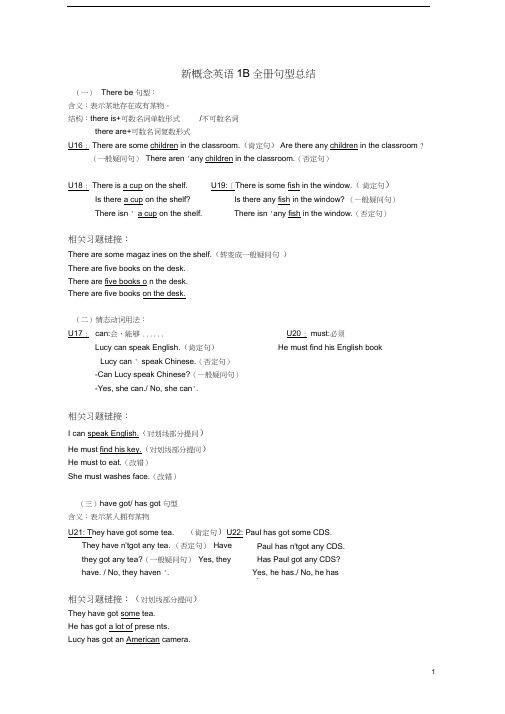
新概念英语1B全册句型总结(一)There be 句型:含义:表示某地存在或有某物。
结构:there is+可数名词单数形式/不可数名词there are+可数名词复数形式U16 : There are some children in the classroom.(肯定句) Are there any children in the classroom ?(一般疑问句)There aren 'any children in the classroom.(否定句)U18 : There is a cup on the shelf. U19:〔There is some fish in the window.(肯定句)Is there a cup on the shelf? Is there any fish in the window? (—般疑问句)There isn ' a cup on the shelf. There isn 'any fish in the window.(否定句)相关习题链接:There are some magaz ines on the shelf.(转变成一般疑问句)There are five books on the desk.There are five books o n the desk.There are five books on the desk.(二)情态动词用法:U17 : can:会,能够...... U20 : must:必须Lucy can speak English.(肯定句)He must find his English bookLucy can ' speak Chinese.(否定句)-Can Lucy speak Chinese?(—般疑问句)-Yes, she can./ No, she can'.相关习题链接:I can speak English.(对划线部分提问)He must find his key.(对划线部分提问)He must to eat.(改错)She must washes face.(改错)(三)have got/ has got 句型含义:表示某人拥有某物U21: They have got some tea. (肯定句)U22: Paul has got some CDS.They have n'tgot any tea. (否定句)Have they got any tea?(一般疑问句)Yes, they have. / No, they haven '.相关习题链接:(对划线部分提问)They have got some tea.He has got a lot of prese nts.Lucy has got an American camera.Paul has n'tgot any CDS. Has Paul got any CDS? Yes, he has./ No, he has n't.(四)like 用法1:当人称代词不是单数第三人称时;U24 : I like vegetables.I don ' like fruit.Do you like orange juice?相关习题链接:They want some wine.(转换成否定句 ) They want some wine.(转换成一般疑问句 ) They want some wine.(提问)They want some wine.(五)like 用法2:当人称代词是单数第三人称he/she/it 时:Unit25 : Karen likes some sugar.Karen does n't like any sugar. Does Karen like any sugar?相关习题链接:广Paul wants a bag of sugar.(转换成否定句 )Paul wants a bag of sugar.(转换成一般疑问句) Paul wants a bag of sugar.(提问) —Paul wants a bag of sugar.(提问)(六)祈使句含义:表示命令,请求别人做某事。
新概念英语青少版1B单词表(含国际音标)
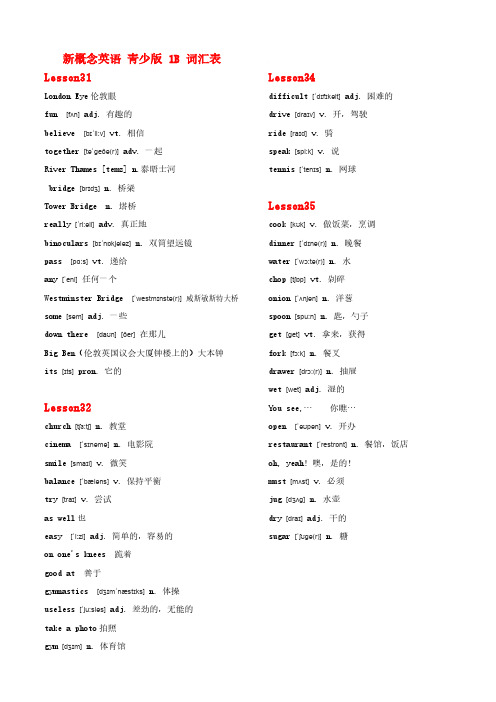
新概念英语青少版 1B 词汇表Lesson31London Eye伦敦眼fun [fʌn] adj. 有趣的believe [bɪˈli:v] vt. 相信together [təˈgeðə(r)] adv. 一起River Thames [temz] n.泰晤士河bridge [brɪdʒ] n. 桥梁Tower Bridge n. 塔桥really [ˈri:əli] adv. 真正地binoculars [bɪˈnɒkjələz] n. 双筒望远镜pass [pɑ:s] vt. 递给any [ˈeni]任何一个Westminster Bridge [ˈwestmɪnstə(r)]威斯敏斯特大桥some [səm] adj. 一些down there [daʊn][ðer]在那儿Big Ben(伦敦英国议会大厦钟楼上的)大本钟its [ɪts] pron. 它的Lesson32church [tʃɜ:tʃ] n. 教堂cinema [ˈsɪnəmə] n. 电影院smile [smaɪl] v. 微笑balance [ˈbæləns] v. 保持平衡try [traɪ] v. 尝试as well也easy [ˈi:zi] adj. 简单的,容易的on one's knees 跪着good at 善于gymnastics [dʒɪmˈnæstɪks] n. 体操useless [ˈju:sləs] adj. 差劲的,无能的take a photo拍照gym [dʒɪm] n. 体育馆Lesson34difficult [ˈdɪfɪkəlt] adj. 困难的drive [draɪv] v. 开,驾驶ride [raɪd] v. 骑speak [spi:k] v. 说tennis [ˈtenɪs] n. 网球Lesson35cook [kʊk] v. 做饭菜,烹调dinner [ˈdɪnə(r)] n. 晚餐water [ˈwɔ:tə(r)] n. 水chop [tʃɒp] vt. 剁碎onion [ˈʌnjən] n. 洋葱spoon [spu:n] n. 匙,勺子get [get] vt. 拿来,获得fork [fɔ:k] n. 餐叉drawer [drɔ:(r)] n. 抽屉wet [wet] adj. 湿的You see,…你瞧…open [ˈəʊpən] v. 开办restaurant [ˈrestrɒnt] n. 餐馆,饭店oh, yeah! 噢,是的!must [mʌst] v. 必须jug [dʒʌg] n. 水壶dry [draɪ] adj. 干的sugar [ˈʃʊgə(r)] n. 糖Lesson36scanner [ˈskænə(r)] n. 扫描仪computer [kəmˈpju:tə(r)] n. 电脑packet [ˈpækɪt] n. 小包coffee [ˈkɒfi] n. 咖啡tea [ti:] n. 茶叶bottle [ˈbɒtl] n. 瓶子orange juice橘子汁fridge [frɪdʒ] n. 电冰箱sea [si:] n. 海Lesson37finish [ˈfɪnɪʃ] vt. 完成why not为什么不?tired [ˈtaɪəd] adj. 疲倦的problem [ˈprɒbləm] n. 难题lots of 许多;大量salad [ˈsæləd] n. 沙拉dish [dɪʃ] n. 菜肴drink [drɪŋk] v. 喝mustn't [ˈmʌsnt] v. 不能peach [pi:tʃ] n. 桃子Help yourself. [jɔ:ˈself]请自便吧!Lesson38grape [greɪp] n. 葡萄buy [baɪ] vt. 购买bread [bred] n. 面包tin [tɪn] n. 金属盒cheese [tʃi:z] n. 奶酪butter [ˈbʌtə(r)] n. 黄油Lesson39surprise [səˈpraɪz] n. 惊奇,意外lesson [ˈlesn] n. 课half past…[hɑ:f]…点半a quarter to/past …[ˈkwɔ:tə(r)]…差/过一刻talk [tɔ:k] v. 谈话find [faɪnd] vt. 发现when [wen] adv. 什么时候look for寻找Lesson40wash [wɒʃ] n. 洗涤then [ðen] adv. 然后Lesson41breakfast blue [ˈbrekfəst]早餐忧郁do [du] v. 助动词want [wɒnt] vt. 想要not really [ˈri:əli]不完全是,不太something [ˈsʌmθɪŋ] pron. 某事,某物train [treɪn] v. 训练stomach [ˈstʌmək] n. 胃have got 有pot [pɒt] n. 壶start [stɑ:t] v. 开始morning [ˈmɔ:nɪŋ] n. 早晨yoghurt ['jəʊgɜ:t] n. 酸奶canteen [kænˈti:n] n. 餐厅terrible [ˈterəbl] adj. 极坏的,可怕的Lesson42chocolate [ˈtʃɒklət] n. 巧克力beer [bɪə(r)] n. 啤酒paper [ˈpeɪpə(r)] n. 纸string [strɪŋ] n. 细绳money [ˈmʌni] n. 金钱spare [speə(r)] adj. 空闲的Lesson43a lot of 很多shy [ʃaɪ] adj. 害羞的introduce sb./sth. to…[ˌɪntrəˈdju:s]向…介绍某人/某物studies ['stʌdɪz] n. 学习,研究(study的复数)true [tru:] adj. 真实的always [ˈɔ:lweɪz] adv. 总是Lesson44jacket [ˈdʒækɪt] n. 夹克衫magazine [ˌmægəˈzi:n] n. 杂志video [ˈvɪdiəʊ] n. 录像带blouse [blaʊz] n. 女士衬衫vegetable [ˈvedʒtəbl] n. 蔬菜relative [ˈrelətɪv] n. 亲戚Lesson45kind [kaɪnd] n. 种,类Let me think 让我想想Japanese [ˌdʒæpə'ni:z] adj.日本的remember [rɪˈmembə(r)] vt. 记得I know!我知道了!lucky [ˈlʌki] adj. 幸运的another [əˈnʌðə(r)] pron. 另一个at any time 随时,任何时候Lesson46British [ˈbrɪtɪʃ] adj. 英国的German [ˈdʒɜ:mən] adj. 德国的plastic [ˈplæstɪk] n. 塑料leather ˈleðə(r)] n. 皮革CD player CD播放机Italian [ɪ'tælɪən] adj. 意大利的watch [wɒtʃ] n. 手表Korean [kə'rɪən] adj. 韩国的handbag [ˈhændbæg] n. 手提包clock [klɒk] n. 钟Swiss [swɪs] n. 瑞士的very much 非常Lesson47salmon [ˈsæmən] n. 鲑鱼piece [pi:s] n. 一片,一块tonight [təˈnaɪt] n.今晚lettuce [ˈletɪs] n. 生菜cucumber [ˈkju:kʌmbə(r)] n. 黄瓜fantastic [fænˈtæstɪk] adj. 极好的pick [pɪk] vi. 摘strawberry [ˈstrɔ:bəri] n. 草莓dessert [dɪˈzɜ:t] n. 甜点healthy [ˈhelθi] adj. 健康的meal [mi:l] n. 膳食,一餐worry [ˈwʌri] n. 担心cream [kri:m] n. 奶油first [fɜ:st] adv. 首先Lesson48hate [heɪt] vt. 憎恨,讨厌sweet [swi:t] n. 糖果,甜食wine [waɪn] n. 葡萄酒Lesson49weekend [ˌwi:kˈend] n.周末make [meɪk] vt. 撰写shopping list 购物清单need [ni:d] n. 需要loaf [ləʊf] n. 一块,一条Sunday lunch 星期日午餐boring [ˈbɔ:rɪŋ] adj.令人厌烦的ice cream 冰激凌nasty [ˈnɑ:sti] adj. 难吃的Lesson50anything [ˈeniθɪŋ] pron.任何事,任何物else [els] adv. 另外,其他bar [bɑ:(r)] n. 条soap [səʊp] n. 肥皂large [lɑ:dʒ] adj.大的match [mætʃ] n. 火柴girlfriend [ˈgɜ:lfrend] n. 女朋友Lesson51self-service [ˈselfˈsɜ:vɪs] adj.自助的menu [ˈmenju:] n. 菜单assistant [əˈsɪstənt] n. 服务员soup [su:p] n. 汤sauce [sɔ:s] n. 调味汁my dear 亲爱的lady [ˈleɪdi] n. 女士Lesson52glove [glʌv] n. 手套already [ɔ:lˈredi] adv. 已经jeans [dʒi:nz] n. 牛仔裤newspaper [ˈnju:zpeɪpə(r)] n. 报纸Lesson53toothache [ˈtu:θeɪk] n. 牙痛look [lʊk] vt. 看起来awful [ˈɔ:fl] adj.不舒服的dentist [ˈdentɪst] n.牙医patient [ˈpeɪʃnt] n. 病人make an appointment [əˈpɔɪntmənt]约时间见面emergency [iˈmɜ:dʒənsi] n. 急诊this afternoon 今天下午miserable [ˈmɪzrəbl] adj. 痛苦的hope for the best [həʊp][best]希望一切都好feel [fi:l] vt. 感到earache [ˈɪəreɪk] n. 耳痛Lesson54day [deɪ] n. 天,一昼夜Monday [ˈmʌndeɪ] n. 星期一Tuesday [ˈtju:zdeɪ]星期二Wednesday [ˈwenzdeɪ]星期三Thursday [ˈθɜ:zdeɪ]星期四Friday [ˈfraɪdeɪ]星期五Saturday [ˈsætədeɪ]星期六headache [ˈhedeɪk] n. 头痛sick [sɪk] adj. 生病的stomach-ache [ˈstʌmək][eɪk] n.胃痛flu [flu:] n. 流感cold [kəʊld] n. 感冒Lesson55Every [ˈevri] adj. 每一(个)different [ˈdɪfrənt] adj. 不同的weather [ˈweðə(r)] n. 天气mean [mi:n] vt. 意思是quite [kwaɪt] adv. 相当,十分ever [ˈevə(r)] adv. 曾经warm [wɔ:m] adj. 温暖的England ['ɪŋɡlənd] n. 英国Atlantic [ət'læntɪk] n. 大西洋climate [ˈklaɪmət] n. 气候often [ˈɒfn] adv. 经常sometimes [ˈsʌmtaɪmz] adv.有时,偶尔especially [ɪˈspeʃəli] adv. 尤其July dʒuˈlaɪ] n. 七月cool [ku:l] adj. 凉爽的difficulty [ˈdɪfɪkəlti] n. 问题,困难change [tʃeɪndʒ] n. 变化month [mʌnθ] n. 月份temperature [ˈtemprətʃə(r)] n.温度China ['tʃaɪnə] n. 中国Lesson56shine [ʃaɪn] n. 闪耀,发光cloudy [ˈklaʊdi] adj. 多云的season [ˈsi:zn] n. 季节usually [ˈju:ʒuəli] adv. 经常never [ˈnevə(r)] adv. 从不France [fræns] n. 法国Russia ['rʌʃə] n. 俄罗斯Africa ['æfrɪkə] n.非洲windy [ˈwɪndi] adj. 刮风的same [seɪm] adj. 同样的Lesson57Many happy returns![rɪ'tɜ:nz]长命百岁August [ˈɔ:gəst] n. 八月year [jɪə(r)] n. 年present [ˈpreznt] n. 礼物bike [baɪk] n. 自行车gear [gɪə(r)] n. 齿轮traffic [ˈtræfɪk] n. 交通dangerous [ˈdeɪndʒərəs] adj. 危险的safe [seɪf] adj. 安全的date [deɪt] n. 日期question [ˈkwestʃən] n.问题ask [ɑ:sk] v. 提问special [ˈspeʃl] adj. 特别的Lesson58January [ˈdʒænjuəri] n. 一月February [ˈfebruəri] n. 二月March [mɑ:tʃ] n. 三月last [lɑ:st] adj. 最后的December [dɪˈsembə(r)] n. 十二月after [ˈɑ:ftə(r)] prep. 在……之后before [bɪˈfɔ:(r)] prep. 在……之前April [ˈeɪprəl] n. 四月May [meɪ] n. 五月June [dʒu:n] n. 六月September [sepˈtembə(r)] n. 九月October [ɒkˈtəʊbə(r)] n. 十月November [nəʊˈvembə(r)] n. 十一月parent [ˈpeərənt] n. 父母Lesson59international [ˌɪntəˈnæʃnəl] adj.国际的event [ɪˈvent] n. 比赛race [reɪs] n. 赛跑mile [maɪl] n. 英里runner [ˈrʌnə(r)] n. 赛跑选手world [wɜ:ld] n. 世界Australia [ɒ'streɪlɪə] n. 澳大利亚compete [kəmˈpi:t]竞争European [ˌjʊərəˈpi:ən] n. 欧洲impressive [ɪmˈpresɪv] adj. 令人印象深刻的rank [ræŋk] n. 等级marathon [ˈmærəθən] n. 马拉松practice [ˈpræktɪs] n. 练习Moroccan [mə'rɒkən] n. 摩洛哥人Brazilian [brəˈzɪliən] n. 巴西人Canadian [kəˈneɪdiən] n. 加拿大人German [ˈdʒɜ:mən] n. 德国人Chinese [ˌtʃaɪˈni:z] n. 中国人name [neɪm] vt. 命名New York [jɔ:k]纽约country [ˈkʌntri] n. 国家Lesson60Australian [ɒˈstreɪliən] n.澳大利亚人live [lɪv] vt. 生活Sydney ['sɪdnɪ] n. 悉尼language [ˈlæŋgwɪdʒ] n. 语言Brazil [brəˈzɪl] n. 巴西Sao Paulo 圣保罗Portuguese [ˌpɔ:tʃuˈgi:z] n. 葡萄牙语Germany ['dʒɜ:mənɪ] n. 德国Berlin [bɜ:'lɪn] n. 柏林Canada ['kænədə] n. 加拿大America [ə'merɪkə] n. 美国。
青少版新概念英语1A、1B词汇总结

meet________ family________ hello________ my________ name________is________ this________ wife________ daughter________ son________and________ nephew________ friend________ teacher________ your________ pen________ yes________ it________ no________ not________ whose________ it’s________ isn’t________ pencil________ hat________ coat________mobile________ ruler________ book________ bag________ what________Hey________ good________ look________ a________ wheel________green________ OK________ now________ flower________ red________ umbrella________ that________ grey________ bird________ key________right________ silver________ chair________ table________ bicycle________ colour________ what________white________ an________ black________dress________ camera________ blue________ desk________ brown________ who________ boy________ which________ on________ man________with________ Mr. ________ he________ father________ woman________she________ mother________ girl________ sister________look at________ young________ in ________old________ car________cousin________ so________ too________ brother________ their________ student________ his________ her________ new________ horse________yellow________ tell me about________ well________ how________ How are you? ________ I________ am________ fine________ but________ very________ sorry________ What’s the matter with? ________ him________ sure________hot________ hungry________ thirsty________ poor________What about? ________ doctor________ busy________ ill________perhaps________ are________ Better safe than sorry. ________ cold________or________ happy________ clever________ stupid________ sad________story________ funny________ silly________ neighbour________nice________ at________sports academy________What do you do? ________ job________art college________ come________ aunt________ writer________ our________ husband________ everybody________ her________Thank you! ________ for________ welcome________ gossip________housewife________photographer________ policeman________ postman________actor________ accountant________ where________over there________tall________ pretty________ from________ English________ American________ Washington________ here________ famous________ expensive________ beautiful________ handsome________ wait________ see________London________ nationality________ describe________ short________Chinese________ French________ fat________ thin________ actress________Mum________ one________ favourite________ long________ schoolbag________ give________ me________ please________Here you are.________ pencil-case________ thing________ Oh,well________ put________ No harm done. ________ case________Thanks.________ Dad________ small________ ball________ box________ big ________clean________ cup________dirty________ floor________ thick________ thin________ under________bed________ light________ plate________ heavy________ shelf________ cupboard________ bump________ night________wake up________ listen________ there________ noise________ living-room________ burglar________ Nonsense!________ kitchen________ torch________ Here it is. ________ house________Be careful.________ someone________ downstairs________ wide-awake________we________ all________ bedroom________ garden________ door________ secretary________ basket________ bowl________ apple________ orange________ near________ river________ tree________ pink________ cat________they________Here are …________ pyjamas________ them________ those________bright red________ a bit________ shirt________ pure white________washing machine________ lovely________ dog________ sock________ jump________hurry________ bus________ Wait a minute! ________ school________Mom________ Oh,dear! ________ empty________Come on! ________ full________ of course________ people________Never mind! ________London Eye伦敦眼fun [f?n] adj. 有趣的believe [bi'li:v] vt. 相信together [t?'ɡe??] adv. 一起River Thames [temz] n.泰晤士河bridge [brid?] n. 桥梁Tower Bridge n. 塔桥really ['ri?li] adv. 真正地binoculars [bai'n?kjul?z] n. 双筒望远镜pass [pɑ:s] vt. 递给any ['eni] 任何一个ship [?ip] n. 船Westminster Bridge ['westminst?] 威斯敏斯特大桥some [s?m] adj. 一些down there [daun] [?ε?] 在那儿Big Ben(伦敦英国议会大厦钟楼上的)大本钟its [its] pron. 它的classroom ['klɑ:srum] n. 教室park [pɑ:k] n. 公园church [t??:t?] n. 教堂cinema ['sin?m?] n. 电影院smile [smail] v. 微笑watch [w?t?] v. 看balance ['b?l?ns] v. 保持平衡do [du: ] v. 做try [trai] v. 尝试as well也easy ['i:zi] adj. 简单的,容易的on one’s knees 跪着good at 善于gymnastics [d?im'n?stiks] n. 体操useless ['ju:slis] adj. 差劲的,无能的Maths [m?θs] n. 数学Music ['mju:zik] n. 音乐take [teik] v. 照(相)take a photo拍照gym [d?im] n. 体育馆difficult ['difik?lt] adj. 困难的drive [draiv] v. 开,驾驶ride [raid] v. 骑speak [spi:k] v. 说tennis ['tenis] n. 网球cook [kuk] v. 做饭菜,烹调dinner ['din?] n. 晚餐help [help] v. 帮忙rice [rais] n. 米饭water ['w?:t?] n. 水pan [p?n] n. 平底锅chop [t??p] vt. 剁碎onion ['?nj?n] n. 洋葱spoon [spu:n] n. 匙,勺子get [ɡet] vt. 拿来,获得fork [f?:k] n. 餐叉drawer [dr?: ] n. 抽屉hand [h?nd] n. 手wet [wet] adj. 湿的You see,… 你瞧… open ['?up?n] v. 开办restaurant ['rest?r??] n. 餐馆,饭店oh, yeah! 噢,是的!must [m?st] v. 必须jug [d??ɡ] n. 水壶dry [drai] adj. 干的food [fu:d] n. 食物sugar ['?uɡ?] n. 糖milk [milk] n. 牛奶scanner ['sk?n?] n. 扫描仪computer [k?m'pju:t?] n. 电脑packet ['p?kit] n. 小包coffee ['k?fi] n. 咖啡tea [ti:] n. 茶叶bottle ['b?tl] n. 瓶子orange juice橘子汁fridge [frid?] n. 电冰箱sea [si:] n. 海eat [i:t] vt. 吃finish ['fini?] vt. 完成why [hwai] adv. 为什么why not为什么不?tired ['tai?d] adj. 疲倦的problem ['pr?bl?m] n. 难题lots of 许多;大量fish [fi?] n. 鱼salad ['s?l?d] n. 沙拉dish [di?] n. 菜肴drink [dri?k] v. 喝mustn’t [m?snt] v. 不能peach [pi:t?] n. 桃子Help yourself. [j?:'self] 请自便吧!meat [mi:t] n. 肉grape [ɡreip] n. 葡萄buy [bai] vt. 购买bread [bred] n. 面包cake [keik] n. 蛋糕tin [tin] n. 金属盒cheese [t?i:z] n. 奶酪butter ['b?t?] n. 黄油surprise [s?'praiz] n. 惊奇,意外lesson ['les?n] n. 课half past… [hɑ:f] …点半a quarter to/past …['kw?:t?] …差/过一刻talk [t?:k] v. 谈话find [faind] vt. 发现bye [bai] int. 再见when [wen] adv. 什么时候look for寻找homework ['h?umw?:k] n. 家庭作业next [nekst] adj. 下一个wash [w??] n. 洗涤then [?en] adv. 然后breakfast blue ['brekf?st] 早餐忧郁do [du: ] v. 助动词want [w?nt] vt. 想要not really ['ri?li] 不完全是,不太something ['s?mθi?] pron. 某事,某物train [trein] v. 训练stomach ['st?m?k] n. 胃have got 有How much?多少……?pot [p?t] n. 壶start [stɑ:t] v. 开始morning ['m?:ni?] n. 早晨yoghurt ['j?ɡ?t] n. 酸奶canteen [k?n'ti:n] n. 餐厅terrible ['ter?bl] adj. 极坏的,可怕的much [m?t?] 多少fruit [fru:t] n. 水果chocolate ['t??k?lit] n. 巧克力beer [bi?] n. 啤酒paper ['peip?] n. 纸string [stri?] n. 细绳money ['m?ni] n. 金钱spare [spε?] adj. 空闲的Good morning!早上好!a lot of 很多shy [?ai] adj. 害羞的introduce sb./sth. to… [,intr?'dju:s] 向……介绍某人/某物studies ['st?dis] n. 学习,研究(study的复数)to 向true [tru:] adj. 真实的always ['?:lweiz] adv. 总是jacket ['d??kit] n. 夹克衫magazine [,m?ɡ?'zi:n] n. 杂志video ['vidi?u] n. 录像带blouse [blauz] n. 女士衬衫skirt [sk?:t] n. 裙子vegetable ['ved?it?bl] n. 蔬菜relative ['rel?tiv] n. 亲戚kind [kaind] n. 种,类Let me think 让我想想Japanese[,d??p?'ni:z] adj.日本的remember [ri'memb?] vt. 记得I know!我知道了!lucky ['l?ki] adj. 幸运的another [?'n???] pron. 另一个like [laik] vt. 喜欢at any time 随时,任何时候British ['briti?] adj. 英国的German ['d??:m?n] adj. 德国的plastic ['pl?stik] n. 塑料leather ['le??] n. 皮革CD player CD播放机Italian [i't?lj?n] adj. 意大利的watch [w?t?] n. 手表Korean [k?'ri?n] adj. 韩国的handbag ['h?ndb?ɡ] n. 手提包clock [kl?k] n. 钟Swiss [swis] n. 瑞士的very much 非常love [l?v] n. 爱,喜欢salmon ['s?m?n] n. 鲑鱼piece [pi:s] n. 一片,一块tonight [t?'nait] n.今晚potato [p?'teit?u] n. 土豆lettuce ['letis] n. 生菜cucumber ['kju:k?mb?] n. 黄瓜fantastic [f?n't?stik] adj. 极好的pick [pik] vi. 摘strawberry ['str?:b?ri] n. 草莓dessert [di'z?:t] n. 甜点healthy ['helθi] adj. 健康的meal [mi:l] n. 膳食,一餐worry ['w?ri] n. 担心cream [kri:m] n. 奶油first [f?:st] adv. 首先hate [heit] vt. 憎恨,讨厌sweet [swi:t] n. 糖果,甜食wine [wain] n. 葡萄酒weekend [,wi:k'end] n.周末shopping ['??pi?] n. 购物supermarket ['sju:p?,mɑ:kit] n. 超市make [meik] vt. 撰写shopping list 购物清单need [ni:d] n. 需要loaf [l?uf] n. 一块,一条Sunday lunch 星期日午餐boring ['b?:ri?] adj.令人厌烦的ice cream 冰激凌nasty ['nɑ:sti] adj. 难吃的anything ['eniθi?] pron.任何事,任何物else [els] adv. 另外,其他bar [bɑ:] n. 条soap [s?up] n. 肥皂large [lɑ:d?] adj.大的match [m?t?] n. 火柴girlfriend ['ɡ?:l,frend] n. 女朋友self-service ['self's?:vis] adj.自助的menu ['menju: ] n. 菜单assistant [?'sist?nt] n. 服务员soup [su:p] n. 汤tomato [t?'mɑ:t?u] n. 西红柿sauce [s?:s] n. 调味汁my dear 亲爱的lady ['leidi] n. 女士glove [ɡl?v] n. 手套already [?:l'redi] adv. 已经jeans [d?i:nz] n. 牛仔裤newspaper ['nju:s,peip?] n. 报纸toothache ['tu:θeik] n. 牙痛look [luk] vt. 看起来awful ['?:ful] adj.不舒服的dentist ['dentist] n.牙医patient ['pei??nt] n. 病人make an appointment [?'p?intm?nt] 约时间见面emergency [i'm?:d??nsi] n. 急诊today [t?'dei] n. 今天this afternoon 今天下午miserable ['miz?r?bl] adj. 痛苦的hope for the best [h?up] [best]希望一切都好feel ['fi:l] vt. 感到earache ['i?reik] n. 耳痛day [dei] n. 天,一昼夜Monday ['m?ndei] n. 星期一Tuesday ['tju:zdei] 星期二Wednesday ['wenzdei] 星期三Thursday ['θ?:zdei] 星期四Friday ['fraidei] 星期五Saturday ['s?t?dei] 星期六headache ['hedeik] n. 头痛sick [sik] adj. 生病的stomach-ache ['st?m?k] [eik] n.胃痛flu [flu:] n. 流感cold [k?uld] n. 感冒every ['evri] adj. 每一(个)different ['dif?r?nt] adj. 不同的weather ['we??] n. 天气mean [mi:n] vt. 意思是quite [kwait] adv. 相当,十分ever ['ev?] adv. 曾经warm [w?:m] adj. 温暖的England ['i?ɡl?nd] n. 英国summer ['s?m?] n. 夏天sunny ['s?ni] adj. 阳光灿烂的Atlantic [?t'l?ntik] n. 大西洋climate ['klaimit] n. 气候often ['?f?n] adv. 经常rain [rein] n. 下雨sometimes ['s?mtaimz] adv.有时,偶尔especially [i'spe??li] adv. 尤其July [d?u:'lai] n. 七月cool [ku:l] adj. 凉爽的difficulty ['difik?lti] n. 问题,困难change [t?eind?] n. 变化month [m?nθ] n. 月份temperature ['temp?rit??] n.温度China ['t?ain?] n. 中国spring [spri?] n. 春天sun [s?n] n. 太阳shine [?ain] n. 闪耀,发光cloudy ['klaudi] adj. 多云的season ['si:z?n] n. 季节usually ['ju:?u?li] adv. 经常never ['nev?] adv. 从不autumn ['?:t?m] n. 秋天winter ['wint?] n. 冬天snow [sn?u] n. 下雪France [frɑ:ns] n. 法国Russia ['r???] n. 俄罗斯Africa ['?frik?] n.非洲windy ['windi] adj. 刮风的same [seim] adj. 同样的Many happy returns![ri't?:nz]长命百岁August [?:'ɡ?st] n. 8月year [ji?] n. 年present ['prez?nt] n. 礼物bike [baik] n. 自行车gear [ɡi?] n. 齿轮traffic ['tr?fik] n. 交通dangerous ['deind??r?s] adj. 危险的about [?'baut] prep. 关于safe [seif] adj. 安全的date [deit] n. 日期question ['kwest??n] n.问题ask [ɑ:sk] v. 提问special ['spe??l] adj. 特别的January ['d??nju?ri] n. 1月February ['febru?ri] n. 2月March [mɑ:t?] n. 3月last [lɑ:st] adj. 最后的December [di'semb?] n. 12月after ['ɑ:ft?] prep. 在……之后before [bi'f?:] prep. 在……之前April ['eipr?l] n. 4月May [mei] n. 5月June [d?u:n] n. 6月September [sep'temb?] n. 9月October [?k't?ub?] n. 10月November [n?u'vemb?] n. 11月parent ['pε?r?nt] n. 父母international [,int?'n???n?l] adj.国际的event [i'vent] n. 比赛race [reis] n. 赛跑mile [mail] n. 英里runner ['r?n?] n. 赛跑选手world [w?:ld] n. 世界Australia [?'streilj?] n. 澳大利亚compete [k?m'pi:t] 竞争European [,ju?r?'pi:?n] n. 欧洲impressive [im'presiv] adj. 令人印象深刻的rank [r??k] n. 等级marathon ['m?r?θ?n] n. 马拉松practice ['pr?ktis] n. 练习Moroccan [m?'r?k?n] n. 摩洛哥人Brazilian [br?'zilj?n] n. 巴西人Canadian [k?'neidi?n] n. 加拿大人German ['d??:m?n] n. 德国人Chinese [,t?ai'ni:z] n. 中国人name [neim] vt. 命名New York [j?:k] 纽约country ['k?ntri] n. 国家Australian [?'streilj?n]n.澳大利亚人live [liv] vt. 生活Sydney ['sidni] n. 悉尼language ['l??ɡwid?] n. 语言Brazil [br?'zil] n. 巴西Sao Paulo 圣保罗Portuguese [,p?:tju'ɡi:z] n. 葡萄牙语Germany ['d??:m?ni] n. 德国Berlin [b?:'lin] n. 柏林Canada ['k?n?d?] n. 加拿大America [?'merik?] n. 美国青少版新概念英语1A、1B词汇总结(看英语写汉语)来源:(/s/blog_609352530100gi5j.html) - 新概念英语青少版1B(Unit 16-20)单词竞赛_英语迷宫探路_新浪博客London Eye________ fun________ believe________together________ River Thames________ bridge________ Tower Bridge________ really________ pass________ binoculars________ any________ ship________ some________ WestminsterBridge________ down there________Big Ben________ its________ open adj.________classroom________ park________ church________cinema________ smile________ watch________ balance________ do________ try________ as well________ easy________ on one’s knees________ good at________ gymnastics________useless________ Maths________ Music________ take aphoto________ take a photo of sb.________ gym________difficult________ drive________ ride________ speak________ tennis________ cook________ dinner________ help________rice________ water________ pan________ chop________onion________ spoon________ get________ fork________drawer________ hand________ wet________ You see________ open v.________ restaurant________ oh, yeah!________must________ jug________ dry________ food________sugar________ milk________ scanner________computer________ packet________ coffee________ tea________ bottle________ orange juice________ fridge________sea________ eat________ finish________ why ________whynot________ tired________ problem________ lots of________ fish________ salad________ dish________ drink v.________mustn’t________ peach________ Help yourself.________meat________ grape________ buy________ bread________cake________ tin ________ cheese________ butter________ surprise________ lesson________ half past________ talk________ a quarter to/past … ________ find________ bye________when________ look for________ next________homework________ wash ________ then________(看汉语写英语)伦敦眼__________ 乐趣__________ 相信__________ 泰晤士河__________一起__________ 桥梁__________ 真正的__________ 递给__________望远镜__________ 任何一个__________ 轮船__________ 一些__________威斯敏斯特桥__________ 下面那里__________ 大本钟__________它的__________ 教堂__________ 公园__________ 教室__________电影院__________ 微笑__________ 看__________ 保持平衡__________做__________ 尝试__________ 也__________ 容易的__________ 跪着__________ 擅长__________ 体操__________ 差劲的__________数学__________ 音乐__________ 照相__________ 体育馆__________困难的__________ 驾驶__________ 骑__________ 说__________ 网球__________ 烹调__________ 晚餐__________ 帮忙__________大米__________ 水__________ 平底锅__________ 切开__________来源:(/s/blog_609352530100gicx.html) - 新概念英语青少版1B(Unit 16-20)单词默写竞赛_英语迷宫探路_新浪博客洋葱__________ 勺子__________ 拿来,得到__________ 叉子__________抽屉__________ 手__________ 湿的__________ 你看__________ 开办__________ 餐馆__________ 必须__________ 罐子__________干燥的__________ 食物__________ 食堂__________ 牛奶__________扫描仪__________ 电脑__________ 小包__________ 咖啡__________茶叶__________ 瓶子__________ 橙汁__________ 冰箱__________海__________ 吃__________ 完成,结束__________ 为什么__________为什么不__________ 疲惫的__________ 问题__________ 很多__________鱼__________ 沙拉__________ 菜肴__________ 喝__________ 不能__________ 桃子__________ 请自便吧!__________肉__________葡萄__________ 买__________ 面包__________ 蛋糕__________ 金属盒__________ 奶酪__________ 黄油__________ 惊奇,意外__________课__________ ……点半__________ 谈话__________……点三刻/一刻__________ 找到__________ 再见__________什么时候__________ 寻找__________ 下一个__________ 家庭作业__________然后__________ 洗__________(看英语写汉语)meet________ family________ hello________ my________ name________ is________ this________ wife________ daughter________ son________ and________ nephew________ friend________ teacher________ your________ pen________ yes________ it________ no________ not________whose________ it’s________ isn’t________ pencil________hat________ coat________ mobile________ ruler________book________ bag________ what________ Hey________good________ look________ a________ wheel________green________ OK________ now________ flower________red________ umbrella________ that________ grey________ bird________ key________ right________ silver________chair________ table________ bicycle________ colour________ what________ colour________ white________ an________ black________ dress________ camera________ blue________desk________ brown________ who________ boy________which________ on________ man________ with________ Mr.________ he________ father________ woman________she________ mother________ girl________ sister________look at________ young________ in ________old________car________ cousin________ so________ too________brother________ their________ student________ his________ her________ new________ horse________ yellow________ tell me about________ well________ how________ How are you?________ I________ am________ fine________ but________ very________ sorry________ What’s the matter with? ________ him________ sure________ hot________ hungry________thirsty________ poor________What about? ________ doctor________ busy________ ill________ perhaps________ are________ Better safe than sorry. ________ cold________ or________ happy________ clever________stupid________ sad________ story________ funny________silly________ neighbour________ nice________ at________ sports academy________What do you do? ________ job________ art college________ come________ aunt________ writer________ our________ husband________ everybody________ her________ Thank you! ________ for________ welcome________gossip________housewife ________photographer________ policeman________ postman________ actor________ accountant________where________来源:(/s/blog_609352530100gdwx.html) - 新概念英语青少版1A(Unit 1-10)单词竞赛_英语迷宫探路_新浪博客over there________ tall________ pretty________ from________ English________ American________ Washington________here________ famous________ expensive________beautiful________ handsome________ wait________ see________ London________ nationality________ describe________short________ Chinese________ French________ fat________ thin________ actress ________Mum________ one________ favourite________ long________ schoolbag________ give________ me________ please________Here you are. ________ pencil-case________ thing________ Oh,well________ put________ No harm done. ________case________Thanks.________ Dad________ small________ ball________box________ big ________clean________ cup________dirty________ floor________ thick________ thin________under________ bed________ light________ plate________ heavy________ shelf________ cupboard________ bump________ night________wake up________ listen________ there________ noise________ living-room________ burglar________ Nonsense! ________ kitchen________ torch________ Here it is. ________house________Be careful.________ someone________ downstairs________wide-awake________ we________ all________ bedroom________ garden________ door________ secretary________basket________ bowl________ apple________ orange________ near________ river________ tree________ pink________cat________ they________Here are …________ pyjamas________ them________those________bright red________ a bit________ shirt________ purewhite________washing machine________ lovely________ dog________sock________ jump________ hurry________ bus________ Wait a minute! ________ school________ Mom________ Oh,dear!________ empty________Come on! ________ full________ of course________people________Never mind! ________。
新概念英语1B知识点总结
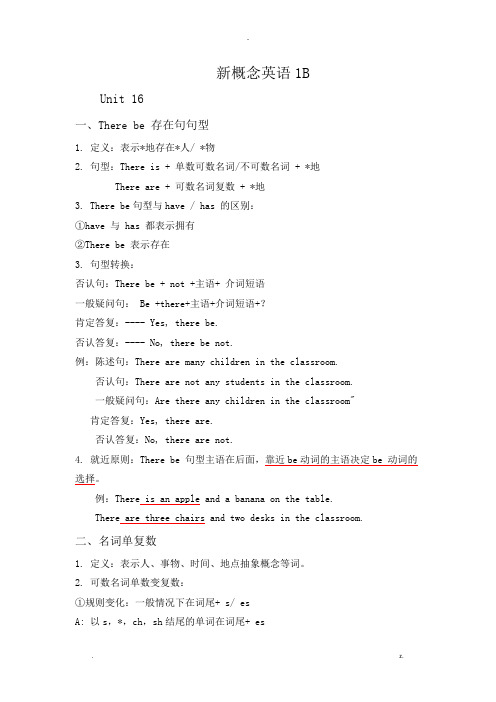
新概念英语1BUnit 16一、There be 存在句句型1. 定义:表示*地存在*人/ *物2. 句型:There is + 单数可数名词/不可数名词 + *地There are + 可数名词复数 + *地3. There be句型与have / has 的区别:①have 与 has 都表示拥有②There be 表示存在3. 句型转换:否认句:There be + not +主语+ 介词短语一般疑问句: Be +there+主语+介词短语+?肯定答复:---- Yes, there be.否认答复:---- No, there be not.例:陈述句:There are many children in the classroom.否认句:There are not any students in the classroom.一般疑问句:Are there any children in the classroom"肯定答复:Yes, there are.否认答复:No, there are not.4. 就近原则:There be 句型主语在后面,靠近be动词的主语决定be 动词的选择。
例:There is an apple and a banana on the table.There are three chairs and two desks in the classroom.二、名词单复数1. 定义:表示人、事物、时间、地点抽象概念等词。
2. 可数名词单数变复数:①规则变化:一般情况下在词尾+ s/ esA: 以s,*,ch,sh结尾的单词在词尾+ esB: 以辅音字母y结尾的单词,把y 变为i,再加esC: 以f/ fe 结尾的单词,变f / fe 为v,再加esD: 以o结尾,有生命的单词+ es ,无生命的+ s注意:以o结尾,+es 的情况:Negroes and heroes like potatoes and tomatoes. 黑人和英雄喜欢土豆和西红柿。
青少版新概念1B知识点

新概念1B知识点概括Unit16--- On the London Eye生词和短语:London eye fun believe together River Thames bridge Tower Bridge really pass binoculars any ship some Westminster down there Big Ben its classroom park church cinema语音:/f/---fun football field fair front referee outfit fifty nephew /v/---very clever silver river heavy five seven eleven twelve重难点:一般疑问句: Is there ……..? / Are there…….? / Is that……..?There be 句型Unit17---Smile, please生词和短语:smile watch balance do try as well easy on one’s knees good at gymnastics useless maths music take take a photo gym difficult drive ride speak tennis语音:/w/---watch wake we welcome well woman Westminster Washington one twelve question quick washing machine重难点:情态动词---can 具有助动词的作用,可以用来构成否定句,疑问句及用于简单的回答。
I can sing a song. / I can’t sing a song.Can you sing a song? Yes, I can. / No, I can’t.Unit 18---Man can cook, too生词和短语:cook dinner help rice water pan chop onion spoon get fork drawer hand wet you see,…. open restaurant oh, year must jug dry food sugar milk scanner computer packet coffee tea bottle orange juice fridge sea语音:/m/---my mum mother meet bedroom family handsome camera /n/---name neighbour night knife spoon onion student husband重难点:在there be 句型中,当主语是不可数名词或可数名词单数时,be动词要用单数形式,当主语是可数名词复数时,be动词要用are。
新概念英语青少版入门级B重点1-6

新概念英语青少版入门级B重点单(1-6单元)Unit 1 That’s my father! 那是我的爸爸!Lesson 1单词:grandfather祖父 grandmother祖母 father父亲 mother母亲 uncle叔叔 aunt婶婶 cousin堂兄弟句型:1.That’s my aunt.那是我的婶婶。
2.-Is that your grandfather?那是你的祖父吗?-Yes,he is./ No,he isn’t. 是的,那是。
/不,那不是。
语法:be动词is的缩写that’s=that is it isn’t=it is notLesson 2单词:man男人 woman女人句型:1. -Who’s that?那是谁?-It’s Max.那是Max。
2. –Who’s that man?那个男人是谁?-He’s the king.他是国王。
语法:特殊疑问词who的用法Lesson 3音标:er /ə /单词:tall高的 short矮的 fat胖的 thin瘦的 behind在…后面 in front of在…前面句型:1.The boy is short.这个男孩很矮。
/ He is fat.他很胖。
2.His cap is blue.他的帽子是蓝色的。
/ His name is Fred.他的名字是Fred。
语法:形容词的用法(修饰名词);形容词性物主代词his、her的用法(后跟名词)。
Unit 2 This is our house.这是我们的房子。
Lesson 1单词:bedroom卧室house房子kitchen厨房sitting room客厅句型:1.This is our sitting room.这是我们的客厅。
2.-Is this your kitchen?这是你的厨房么?-Yes,it is/No,it isn’t.是的,这是。
/不,这不是语法:形容词性的物主代词our、your、their的用法(后跟名词)Lesson 2单词:bathroom浴室between在….中间dining room餐厅next to在….旁边句型:1. –Where’s Pop? Pop在哪里?-He’s in the dinning room.他在餐厅。
新概念英语青少版1B-词汇语法知识要点

Unit 16Words andExpressions:London Eye伦敦眼fun 乐趣believe 相信together 一起River Thames 泰晤士河baidge 桥Tower Bridge 塔桥really 真正地pass 递给binoculars 望远镜any 任何一个some 一些Westminster Bridge 威斯敏斯特桥down there 下面那里Big Ben 大笨钟classroom 教室church 教堂cinema 电影院Grammar:some和any的用法。
some和any都可以修饰复数名词。
不同的是, some用在肯定句中, 而any用在否定句和疑问句中。
Unit 17Words andExpressions:smile微笑watch 看balance 保持平衡do 做try 尝试as well 也easy 简单的no one's knees 跪着good at 擅长gymnastics 体操useless 差劲的, 无能的maths 数学music 音乐take a photo 照相gym 体育馆difficult 困难的drive 开, 驾驶ride 骑speak 说tennis 网球Grammar:1.can的用法。
can是情态动词, 不能在句中单独作谓语, 必须和其他动词原形一起构成谓语。
情态动词没有人称和数的变化, 也就是说, 不管主语是第几人称, 是单数还是复数, can都没有变化。
can既可以表示能力, 也可以表示可能性。
口诀:肯定用can加原形, 否定把can变can't, 疑问can就往前提, 原形留在主语后。
2.b.goo.at和eles.at。
这两个词意思正好相反,分别表示“在某方面擅长”和“在某方面差劲”,at后可接名词或代词,表示擅长或差劲的方面。
Unit 18Words andExpressions:cook做饭菜, 烹调dinner 晚餐rice 大米pan 平底锅chop 切开onion 洋葱spoon 勺子fork 叉子drawer 抽屉wet 湿的You see,…你看, ……restaurant 餐馆, 饭店must 必须jug 罐子dry 干燥的sugar 糖食milk 牛奶scanner 扫描仪computer 电脑packet 小包coffee 咖啡tea 茶叶bottle 瓶子orange juice 橙汁fridge 冰箱sea 海Grammar:可数名词和不可数名词。
新概念英语青少版1A1B单词表词汇

新概念英语青少版 1A 词汇表Lesson 1meet [mi:t] vt.遇见;满足vi.相遇;集合the [ðə, ðɪ] art.这,那family ['fæmɪlɪ] n.家庭,家族Hello ['hə'ləʊ] int.喂my [maɪ] pron.我的name ['neɪm] n.名字is [ɪz] v.是this [ðɪs] a.这;这个wife [waɪf] n.妻子How do you do? 您好daughter ['dɔ:tə] n.女儿son [sʌn] n.儿子Hi! 你好,嘿,喂and [ænd, ənd] conj.和,又,并,则nephew ['nevju:] n.侄子,外甥Nice to meet you. 很高兴认识你。
friend [frend] n.朋友teacher ['ti:tʃə] n.教师Mrs. n....夫人Lesson2your [jɔ:] pron.你的,你们的pen [pen] n.钢笔yes [jes] ad.是,是的Whose [hu:z] pron.谁的No [nəʊ] ad.不,并不a.没有的not [nɒt] ad.不,没有it [ɪt] pron.它it's pn. 它是isn't 不是pencil ['pensl] n.铅笔hat [hæt] n.帽子coat [kəʊt] n.外套,上衣mobile ['məʊbaɪl] 手机ruler ['ru:lə] n.直尺book [bʊk] n.书籍bag [bæg] n.袋,包Lesson 3what [wɒt] pron.什么Hey [heɪ] interj. 嘿good [gʊd] a.好的look [lʊk] n.看a [eɪ, ə] art.一(个),每一(个) wheel [wi:l] n.轮,车轮green [gri:n] a.绿色的 n.绿色OK ['əʊ'keɪ] int.行,好now [naʊ] n.现在flower ['flaʊə] n.花red [red] a.红色的n.红色umbrella [ʌm'brelə] n.伞,雨伞that [ðæt] a.那,那个grey [greɪ] n./a.灰色(的)bird [bɜ:d] n.鸟,禽key [ki:] n.钥匙right [raɪt] a.正确的silver ['sɪlvə] n.银色的chair [tʃeə] n.椅子table ['teɪbl] n.桌子Lesson 4bicycle ['baɪsɪkl] n.自行车colour ['kʌlə] n.颜色what colour...? ......什么颜色?an [æn, ən] art.一(个,件...) white [waɪt] a.白的n.白色black [blæk] a.黑色的,黑暗的dress [dres] n.连衣裙camera ['kæmərə] n.照相机,摄影机blue [blu:] a.蓝色的 n.蓝色desk [desk] n.书桌,办公桌brown [braʊn] n.褐色,棕色Lesson5who [hu:] pron.谁boy [bɒɪ] n.男孩,少年,家伙which ['wɪtʃ] pron.哪一个a.哪一个on [ɒn] prep.在…上man [mæn] n.男人with [wɪð] prep.有,带着Mr. n.先生he [hi:] pron.(主格)他father ['fɑ:ðə] n.父亲woman ['wʊmən] n.妇女,女性she [ʃi:, ʃɪ] pron.她mother ['mʌðə] n.母亲girl [gɜ:l] n.女孩子sister [sɪstə] n.姐妹look at 看着;注视;察看young [jʌŋ] a.年轻的n.青年们in [ɪn] prep.在…里old [əʊld] a.陈旧的cousin ['kʌzn] n.堂(表)兄弟(姐妹) Oh 噢!car [kɑ:] n.轿车so [səʊ] conj.那么,这样看来too [tu:] ad.也,还;太their [ðeə] pron.他(她,它)们的brother ['brʌðə] n.兄弟student ['stju:dənt] n.学生his [hɪs] pron.他的,他的东西her [hɜ:, hə] pron.(宾格)她,她的new [nju:] a.新的Lesson6horse [hɔ:s] n.马Tell me about 告诉我关于...... yellow ['jeləʊ] a.黄色的n.黄色taxi ['tæksɪ] n.出租汽车Lesson7well [wel] ad.健康的how [haʊ] ad.怎么,怎样,多少How are you? 你好吗?I [aɪ] pron.(主格)我am [æm, əm] v.是fine [faɪn] a.健康的,舒适的but [bʌt] conj.但是,可是very ['verɪ] ad.很,非常sorry ['sɒrɪ] a.难过的;对不起的him [hɪm] pron.(宾格)他What's the matter with? ......怎么了?hot [hɒt] a.热的,刺激的,辣的sure [ʃʊə] a.确信的,确实的hungry ['hʌŋgrɪ] a.饥饿的,渴望的thirsty ['θɜ:stɪ] a.渴的;渴望的poor [pʊə] a.贫穷的;可怜的What about? ......呢?doctor ['dɒktə] n.医生,博士busy ['bɪzɪ] a.繁忙的ill [ɪl] a.有病的perhaps [pə'hæps] ad.也许,可能are [ɑ:] v.是Better safe than sorry 有备无患!cold [kəʊld] a.冷的Lesson8or [ɔ:, ə] conj.或,或者clever ['klevə] a.聪明的,机敏的happy ['hæpɪ] a.快乐的,幸福的stupid ['stju:pɪd] a.愚蠢的story ['stɔ:rɪ] n.故事,小说funny ['fʌnɪ] a.好笑的,有趣的,滑稽的sad [sæd] a.悲哀的silly ['sɪlɪ] a.傻的,愚蠢的Lesson9neighbour ['neɪbə] n.邻居nice ['naɪs] a.美好的,令人愉快的What do you do? 你是做什么工作的?at [æt, ət] prep.在sports academy 体育学院come [kʌm] vi.来,来到,出现art college 艺术学院writer ['raɪtə] n.作者,作家aunt [ɑ:nt] n.伯母,婶母,姑母our ['aʊə] pron.我们的husband ['hʌzbənd] n.丈夫Thank you! 谢谢你!everybody ['evrɪbɒdɪ] pron.每人,人人for [fɔ:, fə] prep.为,给,因为welcome ['welkəm] int.欢迎n.欢迎vt.欢迎Lesson10her [hɜ:, hə] pron.(宾格)她,她的housewife ['haʊswaɪf] n.家庭主妇job [dʒɒb] n.职业,工作photographer [fə'tɒgrəfə] n. 摄影师policeman [pə'li:smən] n.警察postman ['pəʊstmən] n.邮递员actor ['æktə] n.男演员accountant [ə'kaʊntənt] n.会计,会计师Lesson11tall [tɔ:l] n.高的,身材高的gossip ['gɒsɪp] n.闲谈,碎嘴子,漫笔pretty ['prɪtɪ] ad.相当地a.漂亮的over there 在那里(指较远处)where [weə] ad.在哪里pron.哪里from [frɒm, frəm, frm] prep.从…来,根据English ['ɪŋglɪʃ] n.英语 a.英国人的American [ə'merɪkən] a.美洲的 n.美国人Washington ['wɒʃɪŋtən] n.华盛顿here [hɪə] ad.这里,向这里famous ['feɪməs] a.著名的expensive [ɪks'pensɪv] a.昂贵的,花钱多的beautiful ['bju:tɪfʊl] a.美的,美丽的handsome ['hændsəm] a.英俊的wait [weɪt] vi.等待n.等待see [si:] vt.看见London ['lʌndən] n.伦敦nationality ['næʃə'nælɪtɪ] n.国籍,民族Lesson12describe [dɪs'kraɪb] vt.形容,描写,描绘short [ʃɔ:t] a.短的;矮的Chinese ['tʃaɪ'ni:z] a.中国的 n.中国人French [frentʃ] a.法国的 n.法国人fat [fæt] a.肥胖的 n.脂肪,肥肉thin [θɪn] a.薄的;淡的;瘦的actress ['æktrɪs] n.女演员Lesson13Mum [mʌm] n.(口语)妈妈one [wʌn] a.一样的东西favourite ['feɪvərɪt] n.特别喜爱的人(或物) a.最爱的long [lɒŋ] a.长的,远的schoolbag n. 书包give [gɪv] vt.送给me [mi:, mɪ] pron.我please [pli:z] ad.请Here you are. 给你。
青少版新概念英语第1B册单词默写表 (英中)

序 英文 1 meat 2 grape
Unit19-Lesson 38
中文 中文 中文
新概念1B单词
新概念1B单词
第 3 页,共 8 页
3 buy 4 bread 5 cake 6 tin 7 cheese 8 butter
序 英文
1 surprise 2 lesson 3 half past… 4 talk 5 a quarter 6 find 7 when 8 look for 9 next
序 英文 1 meat 2 grape
Unit19-Lesson 38
中文 中文 中文
1 cook 2 dinner 3 help 4 rice 5 water 6 pan 7 chop 8 onion 9 spoon 10 get 11 fork 12 drawer 13 hand 14 wet 15 You see 16 open 17 restaurant 18 must 19 jug 20 dry 21 food 22 sugar 23 milk
Unit21-Lesson 42
序 英文
1 much 2 fruit 3 chocolate 4 beer 5 paper 6 string 7 money 8 spare 9 Good morning!
中文
序 英文
1 difficult 2 drive 3 ride 4 speak 5 tennis
Unit17-Lesson 34 中文
序 英文
Unit18-Lesson 35 中文
新概念1B单词
新概念1B单词
第 2 页,共 8 页
1 cook 2 dinner 3 help 4 rice 5 water 6 pan 7 chop 8 onion 9 spoon 10 get 11 fork 12 drawer 13 hand 14 wet 15 You see 16 open 17 restaurant 18 must 19 jug 20 dry 21 food 22 sugar 23 milk
新概念青少版1B 单词默写
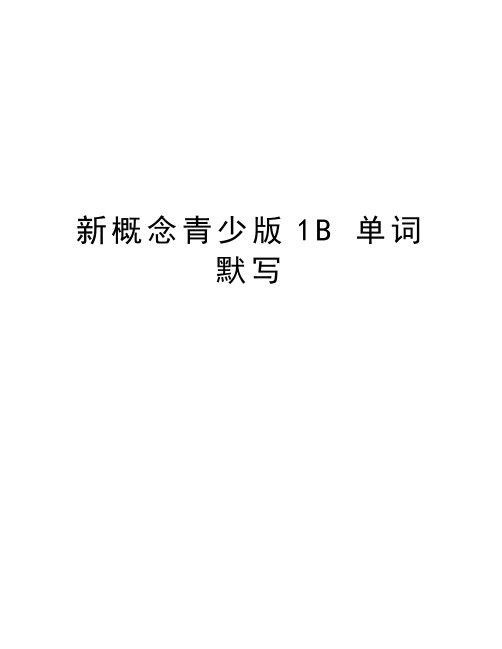
国家
德国人
澳大利亚人
中国人
圣保罗
生活
葡萄牙语
悉尼
德国
语言
柏林
巴西
美国
加拿大
意大利的
德国的
手表
塑料
韩国的
爱,喜欢
手提包
鲑鱼
钟
一片,一块
瑞士的
金晚
土豆
非常
生菜
膳食,一餐
黄瓜
担心
极好的
奶油
摘
首先
草莓
憎恨,讨厌
甜点
葡萄酒
健康的
糖果,甜食
购物清单
周末
需要
购物
一块,一条
超市
星期日午餐
撰写
另外,其他
令人讨厌的
条
冰激凌
肥皂
难吃的
大的
任何事\任何物
女朋友
火柴
西红柿
自助的
调味汁
菜单
亲爱的
服务员
女士
汤
牛仔裤
手套
报纸
已经
病人
牙痛
约时间见面
看起来
急诊
不舒服的
今天
牙医
耳痛
今天下午
天,一昼夜
痛苦的
星期一
希望一切都好
星期二
感到
头痛
星期三
生病的
星期四
胃痛
星期五
流感
星期六
感冒
每一(个)
天气
不同的
ቤተ መጻሕፍቲ ባይዱ意思是
夏天
相当,十分
阳光灿烂的
曾经
大西洋
温暖的
气候
英国
七月
经常
凉爽的
新概念英语青少版1B单词句型整理
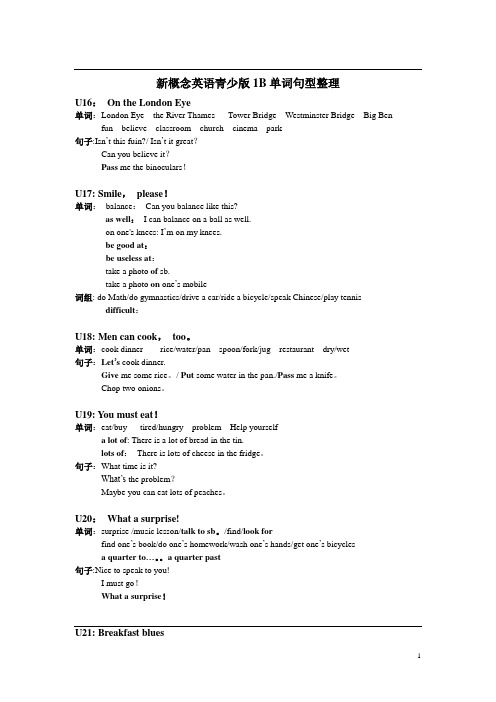
新概念英语青少版1B单词句型整理U16:On the London Eye单词:London Eye the River Thames Tower Bridge Westminster Bridge Big Ben fun believe classroom church cinema park句子:Isn’t this fuin?/ Isn’t it great?Can you believe it?Pass me the binoculars!U17: Smile,please!单词:balance:Can you balance like this?as well:I can balance on a ball as well.on one's knees: I’m on my knees.be good at:be useless at:take a photo of sb.take a photo on one’s mobile词组: do Math/do gymnastics/drive a car/ride a bicycle/speak Chinese/play tennis difficult:U18: Men can cook,too。
单词:cook dinner rice/water/pan spoon/fork/jug restaurant dry/wet句子:Let’s cook dinner.Give me some rice。
/ Put some water in the pan./Pass me a knife。
Chop two onions。
U19: You must eat!单词:eat/buy tired/hungry problem Help yourselfa lot of: There is a lot of bread in the tin.lots of:There is lots of cheese in the fridge。
新概念青少版1B单词表英中文(打印)

新概念英语青少版1B单词表Lesson 31London Eye伦敦眼fun adj. 有趣的believe vt. 相信together adv. 一起River Thames n.泰晤士河bridge n. 桥梁Tower Bridge n. 塔桥really adv. 真正地pass vt. 递给binoculars n. 双筒望远镜any 任何一个ship n. 船some adj. 一些Westminster Bridge 威斯敏斯特大桥down there 在那儿Big Ben 大本钟Its 它的Lesson32 classroom n. 教室park n. 公园church n. 教堂cinema n. 电影院1Lesson33smile v. 微笑watch v. 看balance v. 保持平衡do v. 做try v. 尝试as well也easy adj. 简单的,容易的on one’s knees跪着good at 善于、擅长gymnastics n. 体操useless adj. 差劲的,无能的Maths n. 数学Music n. 音乐take v. 照(相)take a photo拍照gym n. 体育馆Lesson34difficult adj. 困难的drive v. 开,驾驶ride v. 骑speak v. 说tennis n. 网球Lesson35cook v. 做饭菜,烹调dinner n. 晚餐help v. 帮忙rice n. 米饭、大米water n. 水pan n. 平底锅chop vt. 切开、剁碎onion n. 洋葱spoon n. 匙,勺子get vt. 拿来,获得fork n. 叉子drawer n. 抽屉hand n. 手wet adj. 湿的You see,…你看…open v. 开办restaurant n. 餐馆,饭店oh, yeah! 噢,是的! must v. 必须jug n. 罐子、水壶dry adj. 干燥的food n. 食物sugar n. 糖milk n. 牛奶Lesson36scanner n. 扫描仪computer n. 电脑packet n. 小包coffee n. 咖啡tea n. 茶叶bottle n. 瓶子orange juice橙汁、橘子汁fridge n. 电冰箱sea n. 海Lesson37eat vt. 吃finish vt. 完成why adv. 为什么why not 为什么不? tired adj. 疲倦的problem n. 问题、难题lots of 许多;大量fish n. 鱼salad n. 沙拉dish n. 菜肴drink v. 喝mustn’t v. 不能peach n. 桃子Help yourself. 请自便吧!Lesson38 meat n. 肉grape n. 葡萄buy vt. 购买bread n. 面包cake n. 蛋糕tin n. 金属盒cheese n. 奶酪butter n. 黄油Lesson39surprise n. 惊奇,意外lesson n. 课half past……点半a quarter to/past ……差/过一刻talk v. 谈话find vt. 找到,发现bye int. 再见when adv. 什么时候look for 寻找next adj. 下一个Lesson40homework n. 家庭作业wash n. 洗涤then adv. 然后Lesson41breakfast blue 早餐忧郁do v. 助动词want vt. 想要not really 不完全是,不太something pron. 某事,某物train v. 训练stomach n. 胃have got 有How much?多少……?pot n. 壶start v. 开始morning n. 早晨yoghurt n. 酸奶canteen n. 餐厅terrible adj. 极坏的,可怕的Lesson42much 多少fruit n. 水果chocolate n. 巧克力beer n. 啤酒paper n. 纸string n. 细绳money n. 金钱spare adj. 空闲的Good morning!早上好! Lesson43a lot of 很多shy adj. 害羞的introduce sb./sth. to… 向…介绍某人/某物to 向studies n. 学习,研究(study的复数) true adj. 真实的always adv. 总是Lesson44jacket n. 夹克衫magazine n. 杂志video n. 录像带blouse n. 女士衬衫skirt n. 裙子vegetable n. 蔬菜relative n. 亲戚Lesson45kind n. 种,类Let me think 让我想想Japanese adj.日本的remember vt. 记得I know!我知道了! lucky adj. 幸运的another pron. 另一个like vt. 喜欢birthday 生日at any time 随时,任何时候Lesson46British adj. 英国的German adj. 德国的plastic n. 塑料leather n. 皮,皮革CD player CD播放机Italian adj. 意大利的watch n. 手表Korean adj. 韩国的handbag n. 手提包clock n. 钟Swiss n. 瑞士的very much 非常Lesson47love n. 爱,喜欢salmon n. 鲑鱼piece n. 一片,一块tonight n.今晚potato n. 土豆lettuce n. 生菜cucumber n. 黄瓜fantastic adj. 极好的pick vi. 摘strawberry n. 草莓dessert n. 甜点healthy adj. 健康的meal n. 膳食,一餐worry n. 担心cream n. 奶油first adv. 首先Lesson48hate vt. 憎恨,讨厌sweet n. 糖果,甜食wine n. 葡萄酒Lesson49weekend n.周末shopping n. 购物supermarket n. 超市make vt. 撰写shopping list 购物清单need n. 需要loaf n. 一块,一条Sunday lunch 星期日午餐Sunday 星期日boring adj.令人厌烦的ice cream 冰激凌nasty adj. 难吃的Lesson50anything pron.任何事,任何物else adv. 另外,其他bar n. 条soap n. 肥皂large adj.大的match n. 火柴girlfriend n. 女朋友Lesson51self-service adj.自助的menu n. 菜单assistant n. 服务员soup n. 汤tomato n. 西红柿sauce n. 调味汁my dear 亲爱的lady n. 女士Lesson52glove n. 手套already adv. 已经jeans n. 牛仔裤newspaper n. 报纸Lesson53toothache n. 牙痛look vt. 看起来awful adj.不舒服的dentist n.牙医patient n. 病人make an appointment 约时间见面emergency n. 急诊today n. 今天this afternoon 今天下午miserable adj. 痛苦的hope for the best 希望一切都好feel vt. 感到earache n. 耳痛Lesson54day n. 天,一昼夜Monday n. 星期一Tuesday 星期二Wednesday 星期三Thursday 星期四Friday 星期五Saturday 星期六Sunday 星期日headache n. 头痛sick adj. 生病的stomach-ache n.胃痛flu n. 流感cold n. 感冒Lesson55every adj. 每一(个) different adj. 不同的weather n. 天气mean vt. 意思是quite adv. 相当,十分ever adv. 曾经warm adj. 温暖的England n. 英国summer n. 夏天sunny adj. 阳光灿烂的Atlantic n. 大西洋climate n. 气候often adv. 经常rain n. 下雨sometimes adv.有时,偶尔especially adv. 尤其July n. 7月cool adj. 凉爽的difficulty n. 问题,困难change n. 变化month n. 月份temperature n.温度China n. 中国Lesson56spring n. 春天sun n. 太阳shine n. 闪耀,发光cloudy adj. 多云的season n. 季节usually adv. 经常never adv. 从不autumn n. 秋天winter n. 冬天snow n. 下雪France n. 法国Russia n. 俄罗斯Africa n.非洲windy adj. 刮风的same adj. 同样的Lesson57Many happy returns!长命百岁August n. 8月year n. 年present n. 礼物bike n. 自行车gear n. 齿轮traffic n. 交通dangerous adj. 危险的about prep. 关于safe adj. 安全的date n. 日期question n.问题ask v. 提问special adj. 特别的Lesson58January n. 1月February n. 2月March n. 3月April n. 4月May n. 5月June n. 6月July n. 7月August n. 8月September 9月October 10月November 11月December 12月last adj. 最后的after prep. 在……之后before prep. 在……之前parent n. 父母Lesson59international adj.国际的event n. 比赛race n. 赛跑mile n. 英里runner n. 赛跑选手world n. 世界Australia n. 澳大利亚compete 竞争European 欧洲的impressive adj. 令人印象深刻的rank n. 等级marathon n. 马拉松赛跑practice n. 练习Moroccan n. 摩洛哥人Brazilian n. 巴西人Canadian n. 加拿大人German n. 德国人Chinese n. 中国人name vt. 命名New York 纽约country n. 国家Lesson60Australian n.澳大利亚人live vt. 生活Sydney n. 悉尼language n. 语言Brazil n. 巴西Sao Paulo 圣保罗Portuguese n. 葡萄牙语Germany n. 德国Berlin n. 柏林Canada n. 加拿大America n. 美国。
新概念英语青少版1B单词表词汇
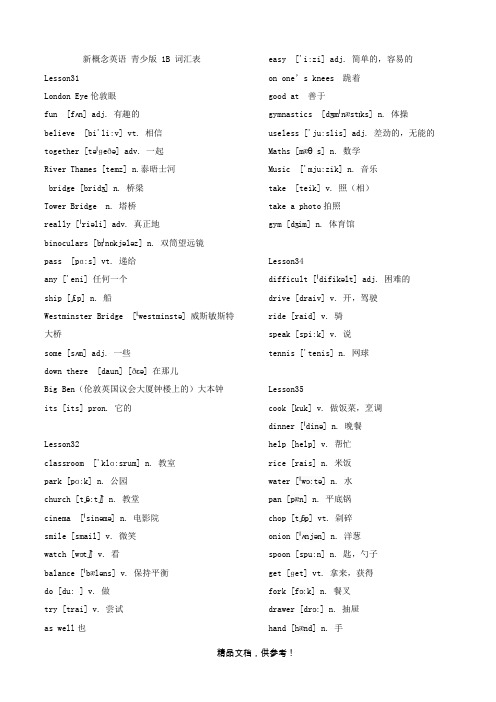
新概念英语青少版 1B 词汇表Lesson31London Eye伦敦眼fun [fʌn] adj. 有趣的believe [bi'li:v] vt. 相信together [təˈɡeðə] adv. 一起River Thames [temz] n.泰晤士河bridge [bridʒ] n. 桥梁Tower Bridge n. 塔桥really [ˈriəli] adv. 真正地binoculars [bɪˈnɒkjələz] n. 双筒望远镜pass [pɑ:s] vt. 递给any ['eni] 任何一个ship [ʃip] n. 船Westminster Bridge [ˈwestminstə] 威斯敏斯特大桥some [sʌm] adj. 一些down there [daun] [ðɛə] 在那儿Big Ben(伦敦英国议会大厦钟楼上的)大本钟its [its] pron. 它的Lesson32classroom ['klɑ:srum] n. 教室park [pɑ:k] n. 公园church [tʃə:tʃ] n. 教堂cinema [ˈsinəmə] n. 电影院smile [smail] v. 微笑watch [wɔtʃ] v. 看balance [ˈbæləns] v. 保持平衡do [du: ] v. 做try [trai] v. 尝试as well也easy ['i:zi] adj. 简单的,容易的on one’s knees 跪着good at 善于gymnastics [dʒɪmˈnæstɪks] n. 体操useless ['ju:slis] adj. 差劲的,无能的Maths [mæθs] n. 数学Music ['mju:zik] n. 音乐take [teik] v. 照(相)take a photo拍照gym [dʒim] n. 体育馆Lesson34difficult [ˈdifikəlt] adj. 困难的drive [draiv] v. 开,驾驶ride [raid] v. 骑speak [spi:k] v. 说tennis ['tenis] n. 网球Lesson35cook [kuk] v. 做饭菜,烹调dinner [ˈdinə] n. 晚餐help [help] v. 帮忙rice [rais] n. 米饭water [ˈwɔ:tə] n. 水pan [pæn] n. 平底锅chop [tʃɔp] vt. 剁碎onion [ˈʌnjən] n. 洋葱spoon [spu:n] n. 匙,勺子get [ɡet] vt. 拿来,获得fork [fɔ:k] n. 餐叉drawer [drɔ:] n. 抽屉hand [hænd] n. 手wet [wet] adj. 湿的You see,…你瞧…open [ˈəupən] v. 开办restaurant [ˈrestərənt] n. 餐馆,饭店oh, yeah! 噢,是的!must [mʌst] v. 必须jug [dʒʌɡ] n. 水壶dry [drai] adj. 干的food [fu:d] n. 食物sugar [ˈʃuɡə] n. 糖milk [milk] n. 牛奶Lesson36scanner [ˈskænə] n. 扫描仪computer [kəmˈpju:tə] n. 电脑packet [ˈpækit] n. 小包coffee [ˈkɔfi] n. 咖啡tea [ti:] n. 茶叶bottle [ˈbɔtl] n. 瓶子orange juice橘子汁fridge [fridʒ] n. 电冰箱sea [si:] n. 海Lesson37eat [i:t] vt. 吃finish [ˈfiniʃ] vt. 完成why [hwai] adv. 为什么why not为什么不?tired [ˈtaiəd] adj. 疲倦的problem [ˈprɔbləm] n. 难题lots of 许多;大量fish [fiʃ] n. 鱼salad [ˈsæləd] n. 沙拉dish [diʃ] n. 菜肴drink [driŋk] v. 喝mustn’t [ˈmʌsnt] v. 不能peach [pi:tʃ] n. 桃子Help yourself. [jɔ:ˈself] 请自便吧!Lesson38meat [mi:t] n. 肉grape [ɡreip] n. 葡萄buy [bai] vt. 购买bread [bred] n. 面包cake [keik] n. 蛋糕tin [tin] n. 金属盒cheese [tʃi:z] n. 奶酪butter [ˈbʌtə] n. 黄油Lesson39surprise [səˈpraiz] n. 惊奇,意外lesson [ˈlesən] n. 课half past… [hɑ:f] …点半a quarter to/past …[ˈkwɔ:tə] …差/过一刻talk [tɔ:k] v. 谈话find [faind] vt. 发现bye [bai] int. 再见when [wen] adv. 什么时候look for寻找next [nekst] adj. 下一个Lesson40homework [ˈhəumwə:k] n. 家庭作业wash [wɔʃ] n. 洗涤then [ðen] adv. 然后Lesson41breakfast blue [ˈbrekfəst] 早餐忧郁do [du: ] v. 助动词want [wɔnt] vt. 想要not really [ˈriəli] 不完全是,不太something [ˈsʌmθiŋ] pron. 某事,某物train [trein] v. 训练stomach [ˈstʌmək] n. 胃have got 有How much?多少……?pot [pɔt] n. 壶start [stɑ:t] v. 开始morning [ˈmɔ:niŋ] n. 早晨yoghurt [ˈjəugə:t] n. 酸奶canteen [kænˈti:n] n. 餐厅terrible [ˈterəbl] adj. 极坏的,可怕的Lesson42much [mʌtʃ] 多少fruit [fru:t] n. 水果chocolate [ˈtʃɔkəlit] n. 巧克力beer [biə] n. 啤酒paper [ˈpeipə] n. 纸string [striŋ] n. 细绳money [ˈmʌni] n. 金钱spare [spɛə] adj. 空闲的Good morning!早上好!Lesson43a lot of 很多shy [ʃai] adj. 害羞的introduce sb./sth. to… [ˌɪntrəˈdju:s] 向……介绍某人/某物studies [ˈstʌdiz] n. 学习,研究(study的复数)to 向true [tru:] adj. 真实的always [ˈɔ:lweiz] adv. 总是Lesson44jacket [ˈdʒækit] n. 夹克衫magazine [ˌmæɡəˈzi:n] n. 杂志video [ˈvidiəu] n. 录像带blouse [blauz] n. 女士衬衫skirt [skə:t] n. 裙子vegetable [ˈvedʒitəbl] n. 蔬菜relative [ˈrelətiv] n. 亲戚Lesson45kind [kaind] n. 种,类Let me think 让我想想Japanese [ˌdʒæpəˈni:z] adj.日本的remember [riˈmembə] vt. 记得I know!我知道了!lucky [ˈlʌki] adj. 幸运的another [əˈnʌðər] pron. 另一个like [laik] vt. 喜欢at any time 随时,任何时候Lesson46British [ˈbrɪtɪʃ] adj. 英国的German [ˈdʒɜ:mən] adj. 德国的plastic [ˈplɑ:stik] n. 塑料leather [ˈleðə] n. 皮革CD player CD播放机Italian [ɪˈtæljən] adj. 意大利的watch [wɔtʃ] n. 手表Korean [kəˈri:ən] adj. 韩国的handbag [ˈhændbæɡ] n. 手提包clock [klɔk] n. 钟Swiss [swis] n. 瑞士的very much 非常Lesson47love [lʌv] n. 爱,喜欢salmon [ˈsæmən] n. 鲑鱼piece [pi:s] n. 一片,一块tonight [təˈnait] n.今晚potato [pəˈteitəu] n. 土豆lettuce ['letis] n. 生菜cucumber [ˈkju:kʌmbə] n. 黄瓜fantastic [fænˈtæstik] adj. 极好的pick [pik] vi. 摘strawberry [ˈstrɔ:bəri] n. 草莓dessert [di'zə:t] n. 甜点healthy ['helθi] adj. 健康的meal [mi:l] n. 膳食,一餐worry [ˈwʌri] n. 担心cream [kri:m] n. 奶油first [fə:st] adv. 首先Lesson48hate [heit] vt. 憎恨,讨厌sweet [swi:t] n. 糖果,甜食wine [wain] n. 葡萄酒Lesson49weekend [,wi:k'end] n.周末shopping [ˈʃɔpɪŋ] n. 购物supermarket [ˈsju:pəˌmɑ:kit] n. 超市make [meik] vt. 撰写shopping list 购物清单need [ni:d] n. 需要loaf [ləuf] n. 一块,一条Sunday lunch 星期日午餐boring [ˈbɔ:riŋ] adj.令人厌烦的ice cream 冰激凌nasty ['nɑ:sti] adj. 难吃的Lesson50anything [ˈeniθiŋ] pron.任何事,任何物else [els] adv. 另外,其他bar [bɑ:] n. 条soap [səup] n. 肥皂large [lɑ:dʒ] adj.大的match [mætʃ] n. 火柴girlfriend [ˈgɜ:lˌfrend] n. 女朋友Lesson51self-service [ˈselfˈsɜ:vɪs] adj.自助的menu ['menju: ] n. 菜单assistant [əˈsistənt] n. 服务员soup [su:p] n. 汤tomato [təˈmɑ:təu] n. 西红柿sauce [sɔ:s] n. 调味汁my dear 亲爱的lady ['leidi] n. 女士Lesson52glove [ɡlʌv] n. 手套already [ɔ:lˈredi] adv. 已经jeans [dʒi:nz] n. 牛仔裤newspaper [ˈnju:sˌpeipə] n. 报纸Lesson53toothache [ˈtu:θˌeɪk] n. 牙痛look [luk] vt. 看起来awful [ˈɔ:ful] adj.不舒服的dentist ['dentist] n.牙医patient [ˈpeiʃənt] n. 病人make an appointment [ə'pintmənt] 约时间见面emergency [i'mə:dʒənsi] n. 急诊today [tə'dei] n. 今天this afternoon 今天下午miserable ['mizərəbl] adj. 痛苦的hope for the best [həup] [best]希望一切都好feel ['fi:l] vt. 感到earache [ˈiəreik] n. 耳痛Lesson54day [dei] n. 天,一昼夜Monday [ˈmʌndi] n. 星期一Tuesday [ˈtju:zdi] 星期二Wednesday ['wenzdei] 星期三Thursday [ˈθə:zdi] 星期四Friday ['fraidei] 星期五Saturday [ˈsætədi] 星期六headache ['hedeik] n. 头痛sick [sik] adj. 生病的stomach-ache [ˈstʌmək] [eik] n.胃痛flu [flu:] n. 流感cold [kəuld] n. 感冒Lesson55every ['evri] adj. 每一(个)different [ˈdifərənt] adj. 不同的weather [ˈweðə] n. 天气mean [mi:n] vt. 意思是quite [kwait] adv. 相当,十分ever [ˈevə] adv. 曾经warm [wɔ:m] adj. 温暖的England [ˈɪŋglənd] n. 英国summer [ˈsʌmə] n. 夏天sunny [ˈsʌni] adj. 阳光灿烂的Atlantic [ætˈlæntɪk] n. 大西洋climate ['klaimit] n. 气候often [ˈɔfən] adv. 经常rain [rein] n. 下雨sometimes [ˈsʌmtaimz] adv.有时,偶尔especially [isˈpeʃəli] adv. 尤其July [dʒu:ˈlai] n. 七月cool [ku:l] adj. 凉爽的difficulty [ˈdifikəlti] n. 问题,困难change [tʃeindʒ] n. 变化month [mʌnθ] n. 月份temperature ['tempəritʃə] n.温度China [ˈtʃaɪnə] n. 中国Lesson56spring [spriŋ] n. 春天sun [sʌn] n. 太阳shine [ʃain] n. 闪耀,发光cloudy ['klaudi] adj. 多云的season [ˈsi:zən] n. 季节usually [ˈjuːʒuəli] adv. 经常never [ˈnevə] adv. 从不autumn [ˈɔ:təm] n. 秋天winter [ˈwintə] n. 冬天snow [snəu] n. 下雪France [fræns] n. 法国Russia [ˈrʌʃə] n. 俄罗斯Africa [ˈæfrikə] n.非洲windy ['windi] adj. 刮风的same [seim] adj. 同样的Lesson57Many happy returns![riˈtə:n]长命百岁August [ɔ:ˈɡʌst] n. 8月year [jə:] n. 年present [ˈprezənt] n. 礼物bike [baik] n. 自行车gear [ɡiə] n. 齿轮traffic [ˈtræfik] n. 交通dangerous [ˈdeindʒərəs] adj. 危险的about [əˈbaut] prep. 关于safe [seif] adj. 安全的date [deit] n. 日期question [ˈkwestʃən] n.问题ask [ɑ:sk] v. 提问special [ˈspeʃəl] adj. 特别的Lesson58January [ˈdʒænjuəri] n. 1月February [ˈfebruəri] n. 2月March [mɑ:tʃ] n. 3月last [lɑ:st] adj. 最后的December [diˈsembə] n. 12月after [ˈɑ:ftə] prep. 在……之后before [biˈfɔ:]] prep. 在……之前April [ˈeiprəl] n. 4月May [mei] n. 5月June [dʒu:n] n. 6月September [səpˈtembə] n. 9月October [ɔkˈtəubə] n. 10月November [nəuˈvembə] n. 11月parent [ˈpɛərənt] n. 父母Lesson59international [ˌɪntəˈnæʃənəl] adj.国际的event [i'vent] n. 比赛race [reis] n. 赛跑mile [mail] n. 英里runner [ˈrʌnə] n. 赛跑选手world [wɜː(r)ld] n. 世界Australia [ɔ:ˈstreɪljə] n. 澳大利亚compete [kəmˈpi:t] 竞争European [ˌjʊərəˈpi:ən] n. 欧洲impressive [im'presiv] adj. 令人印象深刻的rank [ræŋk] n. 等级marathon [ˈmærəˌθɔn] n. 马拉松practice [ˈp ræktis] n. 练习Moroccan [məˈrɒkən] n. 摩洛哥人Brazilian [brəˈzɪliən] n. 巴西人Canadian [kəˈneɪdjən] n. 加拿大人German [ˈdʒɜ:mən] n. 德国人Chinese [tʃaɪˈni:z] n. 中国人name [neim] vt. 命名New York [jɔ:k] 纽约country [ˈkʌntri] n. 国家Lesson60Australian [ɔ:ˈstreɪljən]n.澳大利亚人live [liv] vt. 生活Sydney ['sidni] n. 悉尼language [ˈlæŋɡwidʒ] n. 语言Brazil [brəˈzil] n. 巴西Sao Paulo 圣保罗Portuguese [ˌpɔ:tʃəˈgi:z] n. 葡萄牙语Germany [ˈdʒɜ:məni:] n. 德国Berlin [bɜ:ˈlɪn] n. 柏林Canada [ˈkænədə] n. 加拿大America [əˈmerɪkə] n. 美国(此文档部分内容来源于网络,如有侵权请告知删除,文档可自行编辑修改内容,供参考,感谢您的支持)。
新概念英语青少版入门级B重点单词和句型

新概念英语青少版入门级B重点单词和句型(共10页)--本页仅作为文档封面,使用时请直接删除即可----内页可以根据需求调整合适字体及大小--新概念英语青少版入门级B重点单词与句子Unit 1 That’s my father! 那是我的爸爸!Lesson 1单词:grandfather祖父 grandmother祖母 father父亲 mother母亲 uncle叔叔 aunt婶婶 cousin堂兄弟句型:’s my aunt.那是我的婶婶。
that your grandfather那是你的祖父吗-Yes,it is./ No,it isn’t. 是的,那是。
/不,那不是。
语法:be动词is的缩写 that’s=that is it isn’t=it is notLesson 2单词:man男人 woman女人句型:1. -Who’s that那是谁-It’s Max.那是Max。
2. –Who’s that man那个男人是谁-He’s the king.他是国王。
语法:特殊疑问词who的用法Lesson 3音标:er /ə /单词:tall高的 short矮的 fat胖的 thin瘦的 behind在…后面 in front of在…前面句型: boy is short.这个男孩很矮。
/ He is fat.他很胖。
cap is blue.他的帽子是蓝色的。
/ His name is Fred.他的名字是Fred。
语法:形容词的用法(修饰名词);形容词性物主代词his、her的用法(后跟名词)。
Unit 2 This is our house.这是我们的房子。
Lesson 1单词:bedroom卧室house房子kitchen厨房sitting room客厅句型: is our sitting room.这是我们的客厅。
this your kitchen这是你的厨房么-Yes,it is/No,it isn’t.是的,这是。
新概念青少版1b知识点总结
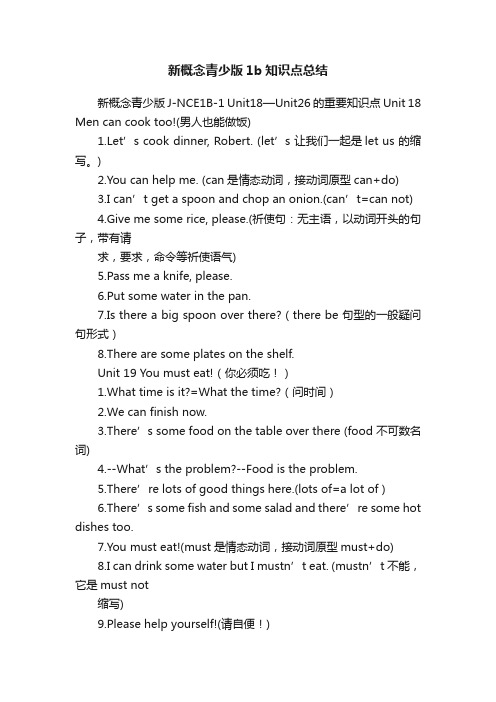
新概念青少版1b知识点总结新概念青少版J-NCE1B-1 Unit18—Unit26的重要知识点Unit 18 Men can cook too!(男人也能做饭)1.Let’s cook dinner, Robert. (let’s 让我们一起是let us 的缩写。
)2.You can help me. (can是情态动词,接动词原型can+do)3.I can’t get a spoon and chop an onion.(can’t=can not)4.Give me some rice, please.(祈使句:无主语,以动词开头的句子,带有请求,要求,命令等祈使语气)5.Pass me a knife, please.6.Put some water in the pan.7.Is there a big spoon over there?(there be 句型的一般疑问句形式)8.There are some plates on the shelf.Unit 19 You must eat!(你必须吃!)1.What time is it?=What the time?(问时间)2.We can finish now.3.There’s some food on the table over there (food 不可数名词)4.--What’s the problem?--Food is the problem.5.There’re lots of good things here.(lots of=a lot of )6.There’s some fish and some salad and there’re some hot dishes too.7.You must eat!(must是情态动词,接动词原型must+do)8.I can drink some water but I mustn’t eat. (mustn’t不能,它是must not缩写)9.Please help yourself!(请自便!)Unit 20 What a surprise!(好一个意外!)1.Nice to speak to you!(通话中常用)2.How are you? And how is Ken?(你好吗?……好吗?问候语)3.I’m very busy. (be busy with sth.如:他正忙于他的家庭作业:He is busywith his homework.)4.Your music lesson is at half past six and it’s a quarter to six now.(at+时间在几点;past 过,half past six 6点半;to 未到,差 a quarter to six 6点差一刻/ 5:45)5.I can’t find my music book.6.I must find my book.7.What a surprise!(感叹句)8.Can we go now?Unit 21 Breakfast Blues(早餐忧郁)1.Do you want any breakfast, Paul?(你想要……)2.I mustn’t train on an empty stomach.3.Have we got any orange juice?(我们有……吗?)4.How much juice do you want?(问数量多少how much+不可数名词;howmany+可数名词)5.There is some juice in the fridge. (juice不可数名词)6.I‘ve got some yoghurt in the fridge.(我有……)7.The food there is terrible.(糟糕的)Unit 22 Watching the neighbors观察邻居们1.She is very shy.(害羞)2. She hasn’t got many friends (没有……)3.There are lots of nice girls in the art college.4.She is happy with Paul.5.He is a very lovely young man.6. He can introduce her to them.7. They are both busy with their studies.Unit 23 An expensive camera一架昂贵的照相机1.What kind of camera has Claire got?(问种类)2.Let me think.3.I can’t remember the name. (remember--forget)4.It’s a very expensive camera. (expensive--cheap)5.Claire wants another one.(另一)6.Claire wants a new one for her birthday.(为了)7.She can give me the old one at any time.Unit 24 A light dinner 一顿清淡的晚餐1.Do you like fish?(你喜欢…?)2.I really like salmon.3.Do you like vegetables?4.There is some lettuce and some cucumber.5.That’s fantastic!6.It’s my favorite kind of food.7.You and Paul can pick some strawberries from the garden. Unit 25 The weekend shopping周末购物1.There isn’t any sugar in the house.2.I must go to the supermarket.3.Let’s make a shopping list.4.How much sugar do we need?5.There isn’t much tea in tin.6.What about food for the weekend?7.These things are all really boring. (boring--interesting) Unit26 A self-service restaurant1.What’s on the menu?2.Show me the menu, please.3.Help yourself!4.That’s vegetable soup, isn’t it?(反意疑问句)5.That’s right.6.Pass me a bowl of soup, please.7.Give me one of those, please. (one of …其中之一)。
新概念1B知识点总结
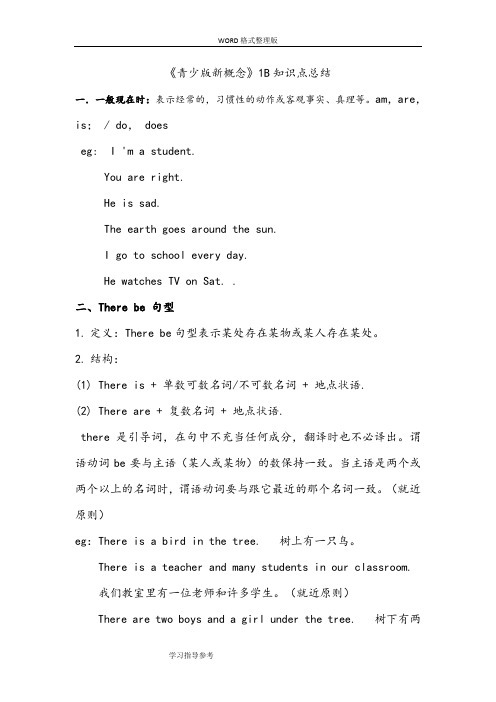
《青少版新概念》1B知识点总结一.一般现在时:表示经常的,习惯性的动作或客观事实、真理等。
am,are,is; / do, doeseg: I 'm a student.You are right.He is sad.The earth goes around the sun.I go to school every day.He watches TV on Sat. .二、There be 句型1.定义:There be句型表示某处存在某物或某人存在某处。
2.结构:(1) There is + 单数可数名词/不可数名词 + 地点状语.(2) There are + 复数名词 + 地点状语.there是引导词,在句中不充当任何成分,翻译时也不必译出。
谓语动词be要与主语(某人或某物)的数保持一致。
当主语是两个或两个以上的名词时,谓语动词要与跟它最近的那个名词一致。
(就近原则)eg:There is a bird in the tree. 树上有一只鸟。
There is a teacher and many students in our classroom.我们教室里有一位老师和许多学生。
(就近原则)There are two boys and a girl under the tree. 树下有两个男孩,一个女孩。
(就近原则)三、Have/has got的用法:1. 定义:它表示某物归某人所有,是一种所属关系, 主语为人,只有“拥有”的意思。
2. 转换:have got, has got(第三人称单数)3. 句型:I have got three sisters.He has got a bike.4. 比较:There be 和 Have/ has goteg: There are some apples in the fridge.We have got some apples in the fridge.注意: some 和 any 的用法1) 一般情况, some用在肯定句中,any用在否定句和疑问句中eg:There are some students in the classroom。
- 1、下载文档前请自行甄别文档内容的完整性,平台不提供额外的编辑、内容补充、找答案等附加服务。
- 2、"仅部分预览"的文档,不可在线预览部分如存在完整性等问题,可反馈申请退款(可完整预览的文档不适用该条件!)。
- 3、如文档侵犯您的权益,请联系客服反馈,我们会尽快为您处理(人工客服工作时间:9:00-18:30)。
新概念1B知识点Unit16--- On the London Eye生词和短语:London eye fun believe together River Thames bridge Tower Bridge really pass binoculars any ship some Westminster down there Big Ben its classroom park church cinema语音:/f/---fun football field fair front referee outfit fifty nephew /v/---very clever silver river heavy five seven eleven twelve重难点:一般疑问句: Is there ……..? / Are there…….? / Is that……..?There be 句型Unit17---Smile, please生词和短语:smile watch balance do try as well easy on one’s knees good at gymnastics useless maths music take take a photo gym difficult drive ride speak tennis语音:/w/---watch wake we welcome well woman Westminster Washington one twelve question quick washing machine重难点:情态动词---can 具有助动词的作用,可以用来构成否定句,疑问句及用于简单的回答。
I can sing a song. / I can’t sing a song.Can you sing a song? Yes, I can. / No, I can’t.Unit 18---Man can cook, too生词和短语:cook dinner help rice water pan chop onion spoon get fork drawer hand wet you see,….open restaurant oh, year must jug dry food sugar milk scanner computer packet coffee tea bottle orange juice fridge sea语音:/m/---my mum mother meet bedroom family handsome camera /n/---name neighbour night knife spoon onion student husband重难点:在there be 句型中,当主语是不可数名词或可数名词单数时,be动词要用单数形式,当主语是可数名词复数时,be动词要用are。
例如:Is there any rice in the drawer? / There is a bottle on the table. / There are some plates on the shelf.Unit 19---Y ou must eat生词和短语:eat finish why why not tired problem lots of fish salad dish drink mustn’t peach help yourself meat grape buy bread cake tin cheese butter语音:/ŋ/---hungry living-room interesting bring ding-doing things English 重难点:情态动词must---must 跟can一样,不能在句子中独立做谓语,而必须跟其他动词原形一起构成谓语,并且也没有人称和数的变化。
含must的肯定句变一般疑问句时要把must提到句首,其他部分不变。
例如:I must go now. / Must you go now? 否定句是I mustn’t go now.Unit 20---What a surprise生词和短语:s urprise lesson half past talk a quarter find bye when look for next homework wash then语音: /l/---Linda Lucy look lesson lots apple milk bowl eleven o’clock重难点:特殊疑问词---when,它针对时间提问,跟学过的what time一样,不同的是when比what time更广泛。
What time 只针对钟点提问,而when还可以针对星期,月份,年份以及所有表示时间的短语提问。
例如:对句子My music lesson is 4:30.中的时间提问,既可以说When is your music lesson? 也可以说What time is your music lesson? 对句子You can call me tomorrow. 中的tomorrow 提问,就只能用When can I call you?Unit 21---Breakfast blues生词和短语:breakfast blues do want not really something train stomach have got how much pot start morning yoghurt canteen much fruit chocolate beer paper string money spare good morning语音: /ə /---a an Karen student mother husband neighbour famous /ɜ:/---bird early girl thirteen thirty word shirt dirty重难点:助动词—do do在句子中不能独立使用作谓语,并通常用于主语为第一人称,第二人称或第三人称复数的疑问句和否定句中。
将肯定句变为疑问时,应将do放在主语的前面,变为否定句时则要在谓语动词前面加do not, 缩写为don’t.Have got---I have got some coffee. 在这句肯定句中,have got表示有,肯定句变否定句时在have后面直接加not,缩写为haven’t,遍一般疑问句要把have提到主语的前面。
要注意的是当主语是第一人称,第二人称或第三人称的复数时,才用have.some和any---some用于肯定句,any用于否定句和疑问句中。
Unit 22---Watching the neighbours生词和短语:a lot of shy many introduce to studies true always CD DVD jacket magazine video blouse skirt vegetable relative语音:/ɪə /--- here dear hear near beer clear ear重难点:have got----当主语是第三人称单数时,have应该变为has。
肯定句中直接用has got,肯定变疑问时把has提到主语前面,而变否定时在has后加not,缩写为hasn’t. 口诀:你“有”我“有”大家“有”,have got最有用,他“有”她“有”它也“有”,就用has换have.There be 句型和have/has got都表示“有”,但这两个“有”表达的含义不同。
There be 句型主要指“某处有某物”,表示存在与位置,而have/has got 主要指“某人拥有某物”,表示所属与拥有。
例如:我有一件夹克衫,应该说I have got a jacket. 床上有一件夹克,应该说There is a jacket on the bed.Unit 23---An expensive camera生词和短语: kind let me think Japanese remember I know lucky another like birthday at any time British German plastic leather CD player Italian watch Korean handbag clock Swiss very much语音:/eə/---there Claire chair fair downstairs where careful重难点:助动词---does does 是用在第三人称单数做主语的句子中,其他用法跟do 是一样的。
当句子中出现does 和doesn’t 的时候,谓语动词要使用原形。
Does 是do 的第三人称单数形式,例如:Peter 想要啤酒,Peter wants some beer.而否定句是Peter doesn’t want any beer. 一般疑问句是Does Peter want any beer? 特殊疑问句是What does Peter want?Unit 24---A light dinner生词和短语: love salmon piece tonight potato lettuce cucumber fantastic pick strawberry dessert healthy meal worry cream first hate sweet wine语音:/ʊə /--poor sure jury/jʊə/--pure cure Europe重难点:英语中,三餐和球类运动这些名词的前面是不加冠词的。
例如:have breakfast, have lunch, have dinner. Play basketball, play football.Unit 25---The weekend shopping生词和短语:weekend shopping supermarket make shopping list need loaf Sunday lunch Sunday boring ice cream nasty anything else bar soap large match girlfriend语音:/i /-- twenty happy heavy family easy busy Lucy strawberry/ju: /--beautiful music new nephew student stupid usual useless重难点:可数名词与不可数名词---不可数名词的数量可以借助一些表示容器的名词来表达,如:two bags of sugar, four packets of tea. 还可以借助表示物品形状的名词来表达,如:a loaf of bread, a piece of paper.可数名词除了可以直接用数字加名词复数表示数量外,也可以借助表示容器的名词和表示物品形状的名词来表达,如:a box of chocolate.need---need作为实义动词,后面可以接名词或代词,例如:I need a loaf of bread. / I don’t need it.Unit 26---- A self-service restaurant生词和短语:self-service menu assistant soup tomato sauce my dear lady glove already jeans newspaper语音:/ʃ /--- self shy shopping show washing-machine English /ʒ /--- usual unusual pleasure measure treasure television重难点:动词show--- 它是可以带双宾语的及物动词(后面可直接接名词或代词作宾语的动词就是及物动词,而不及物动词与之相反,后面不能直接接宾语)。
